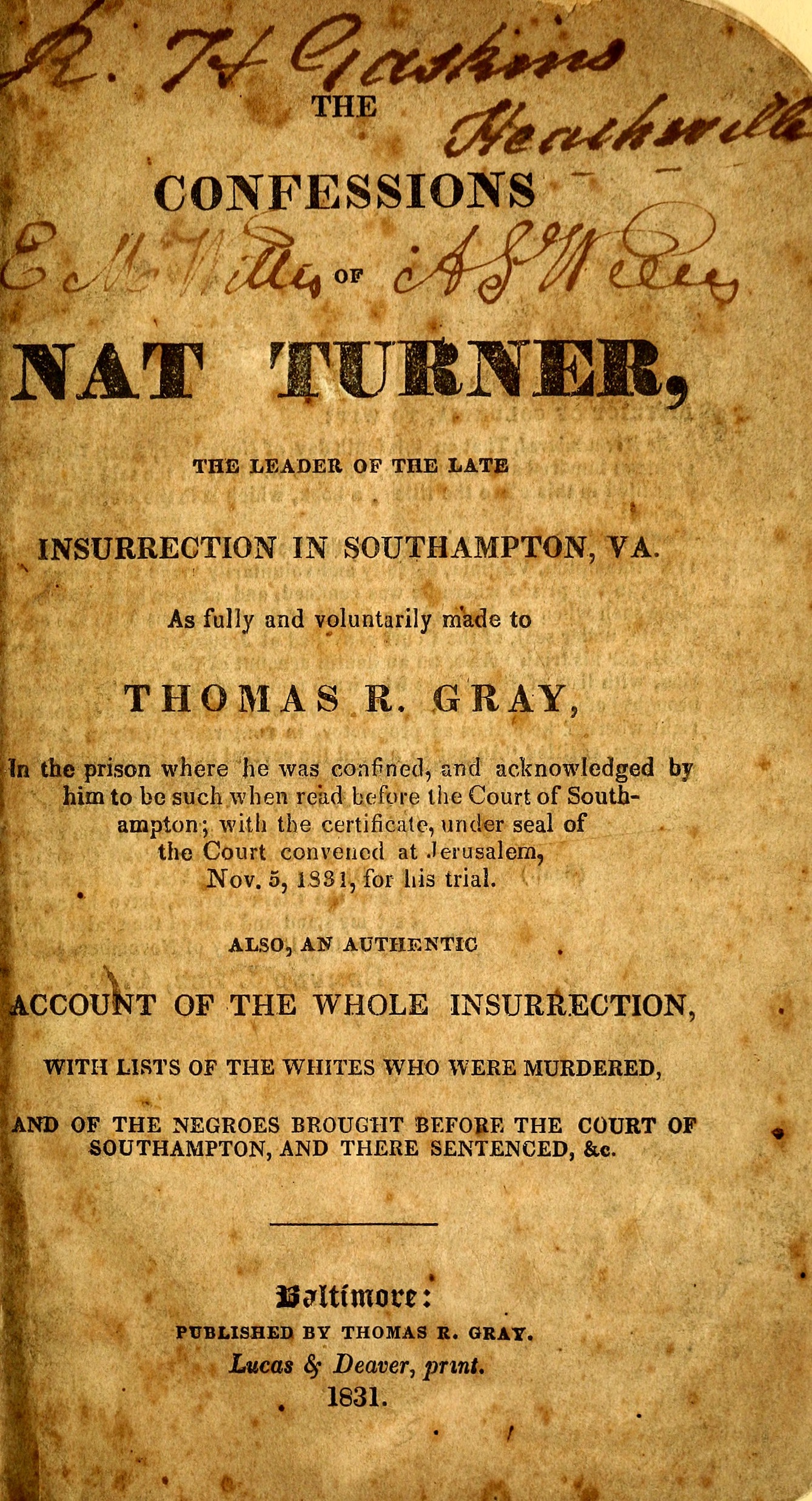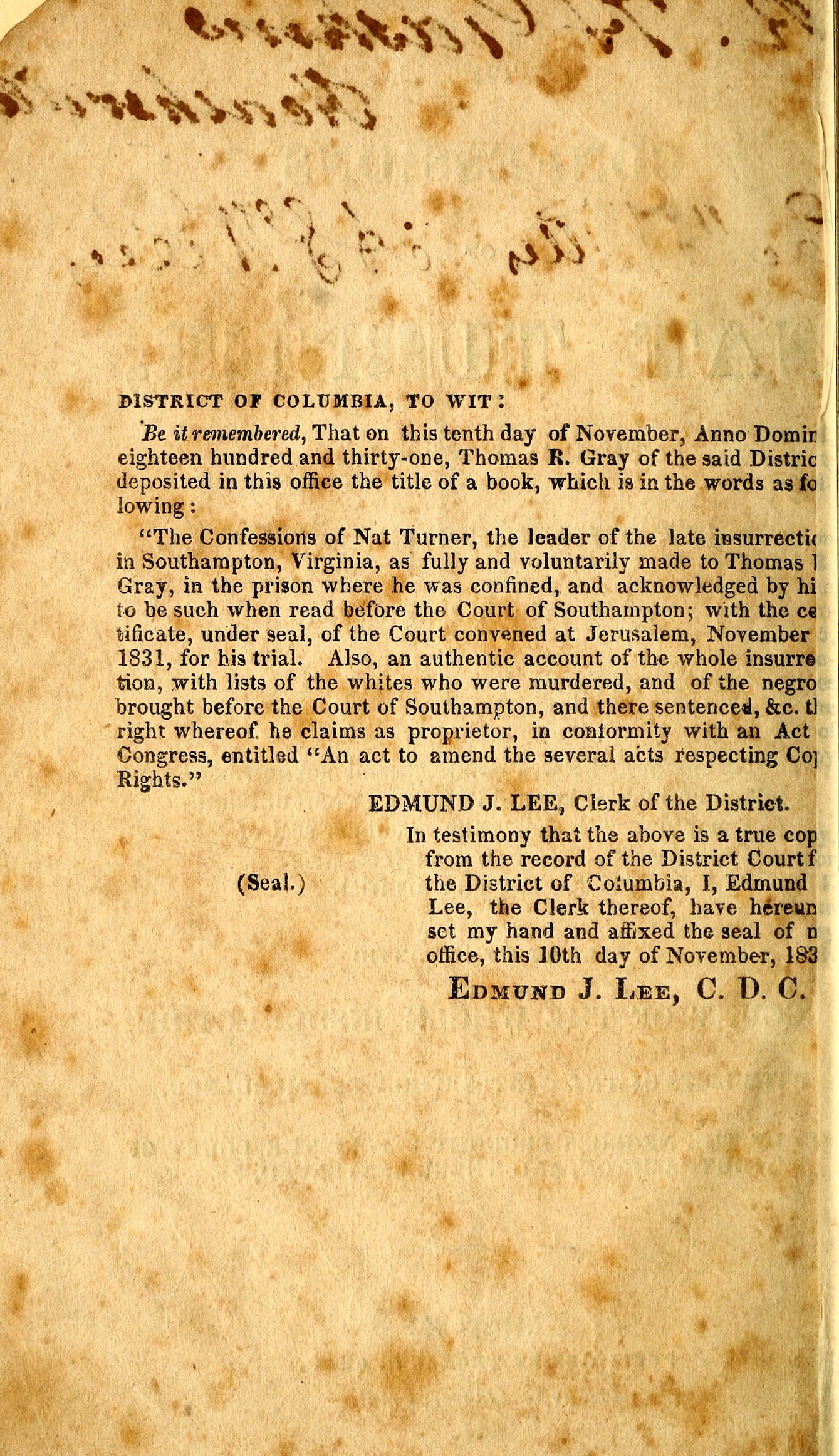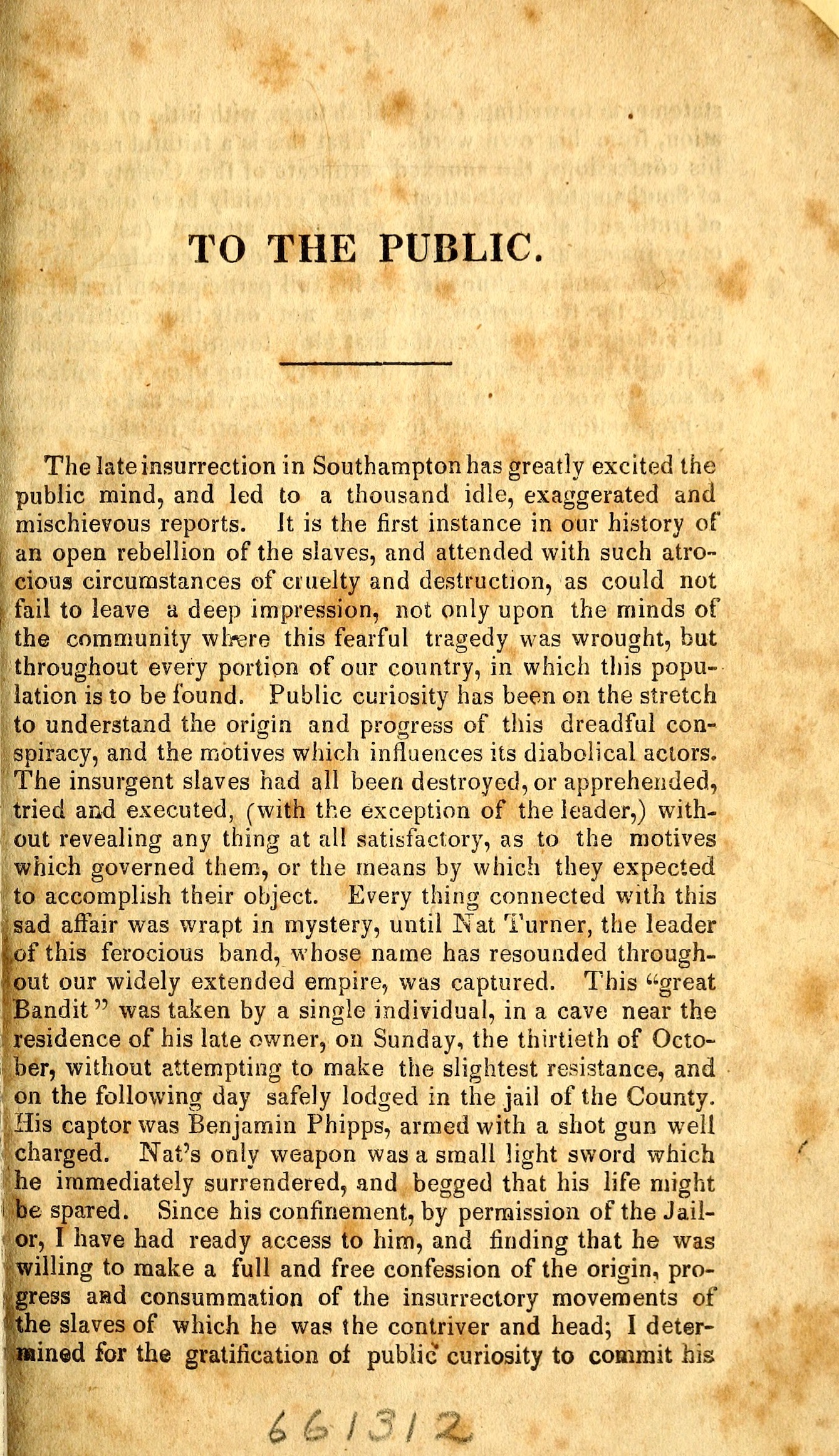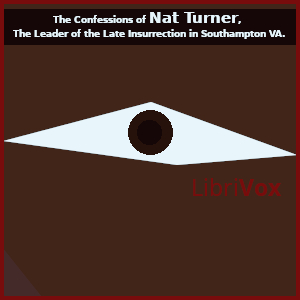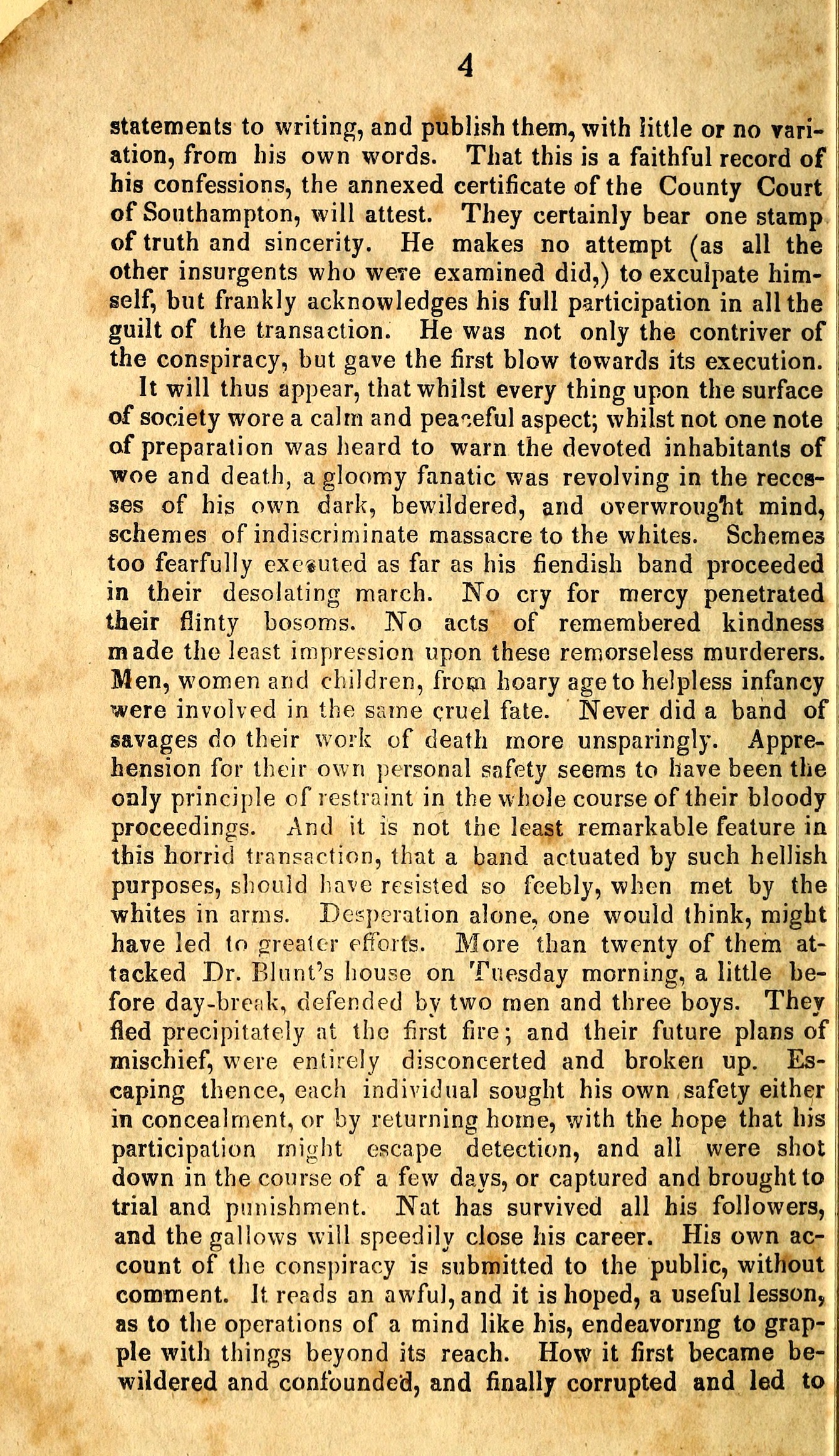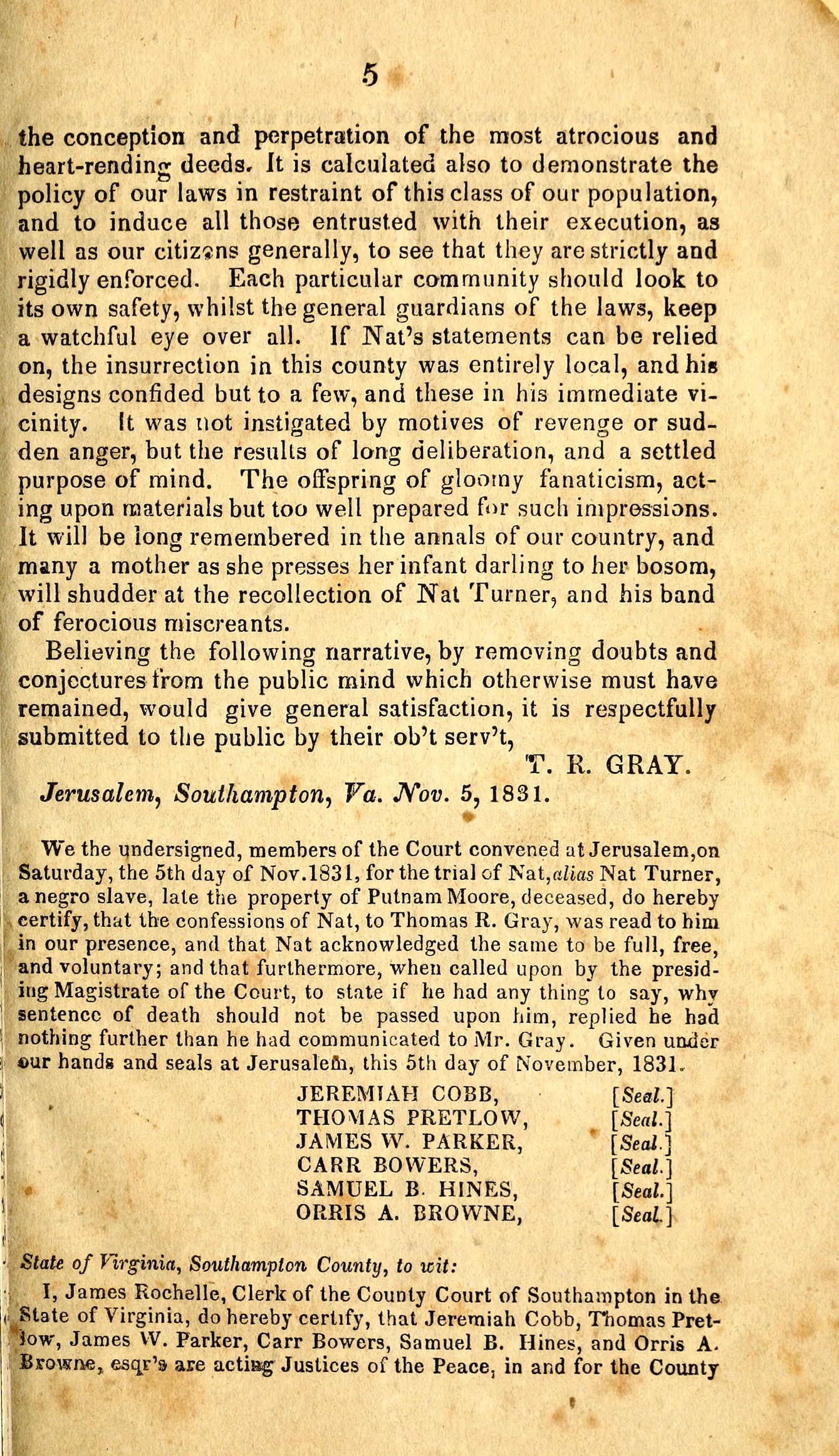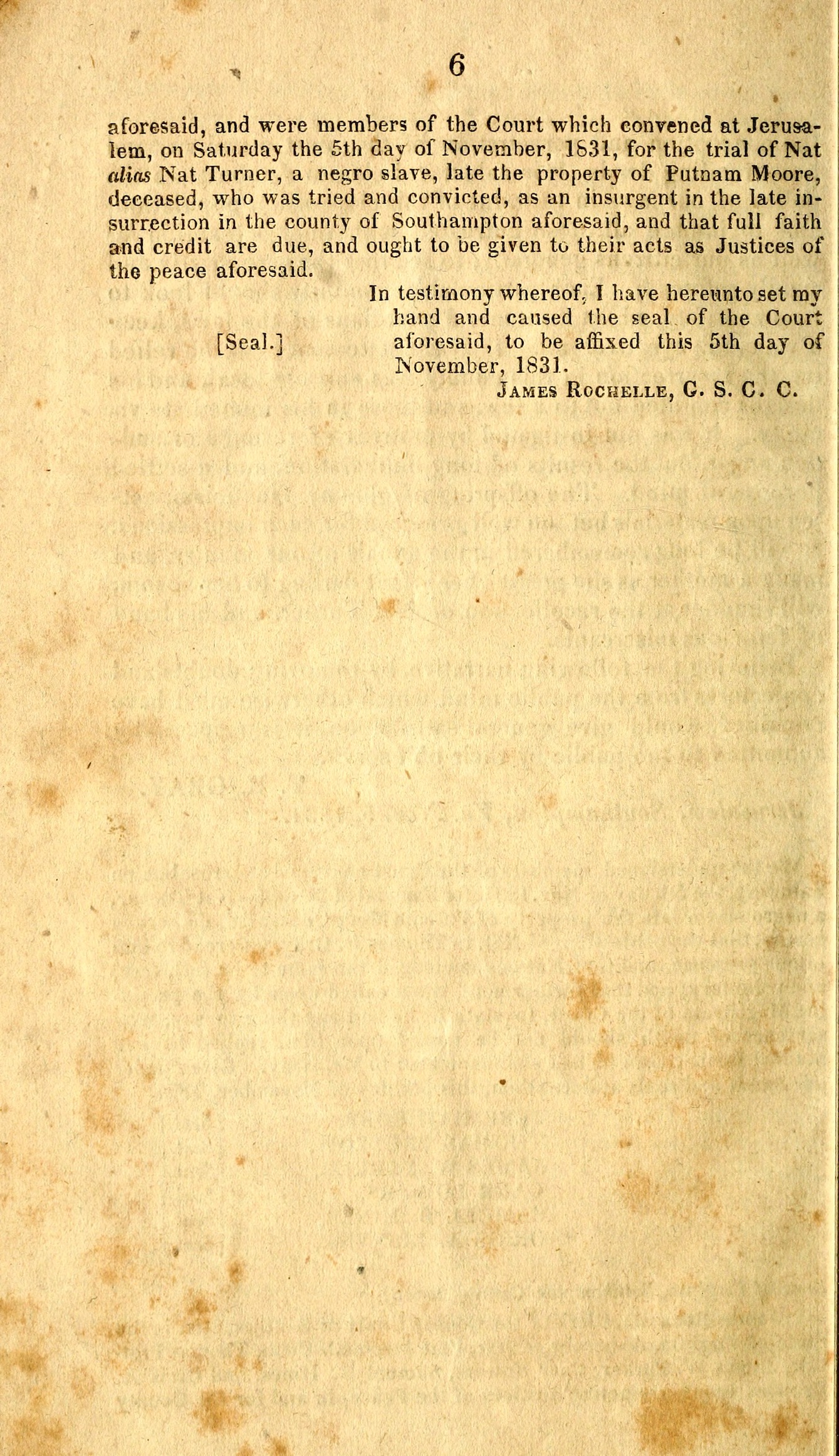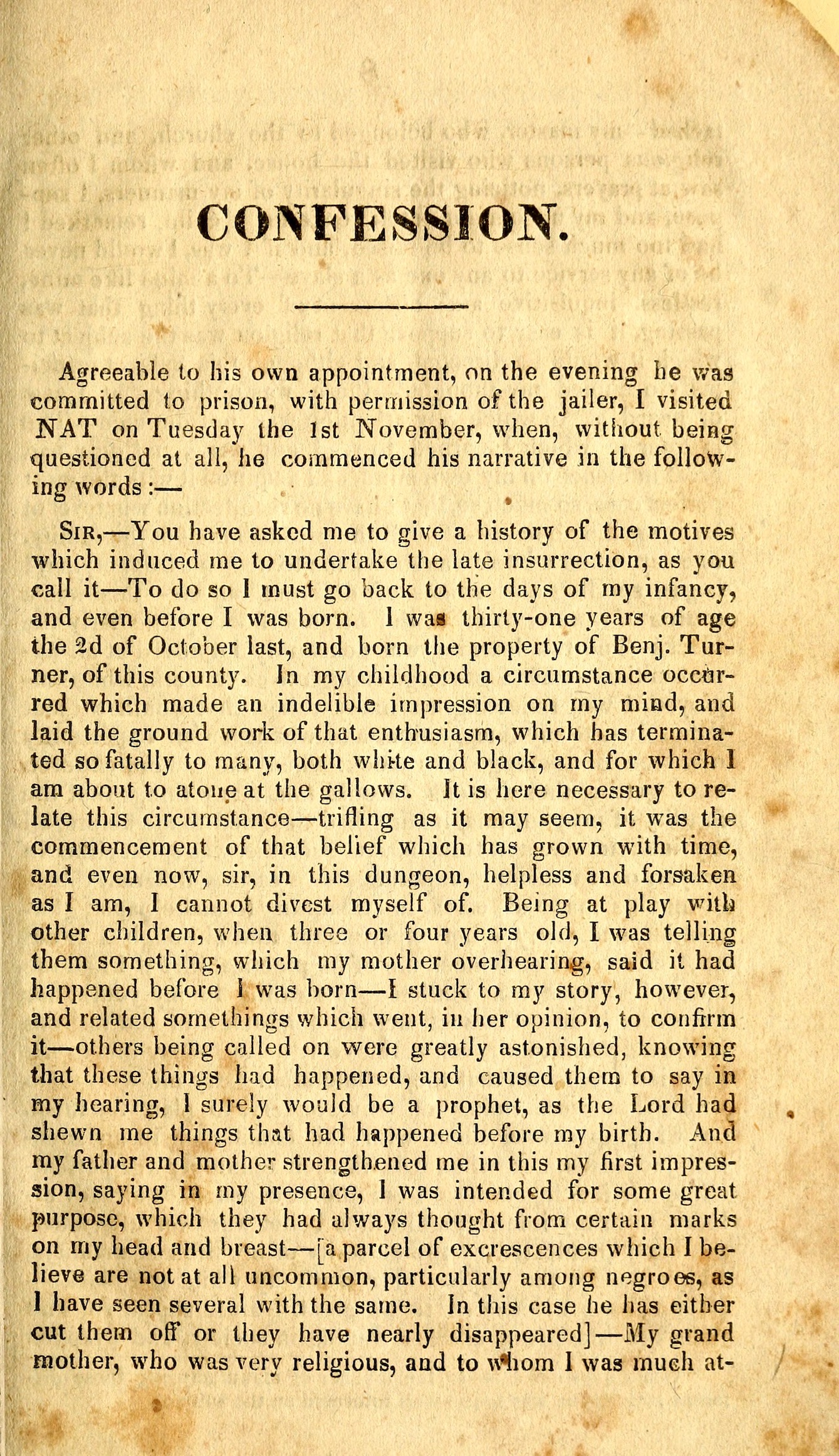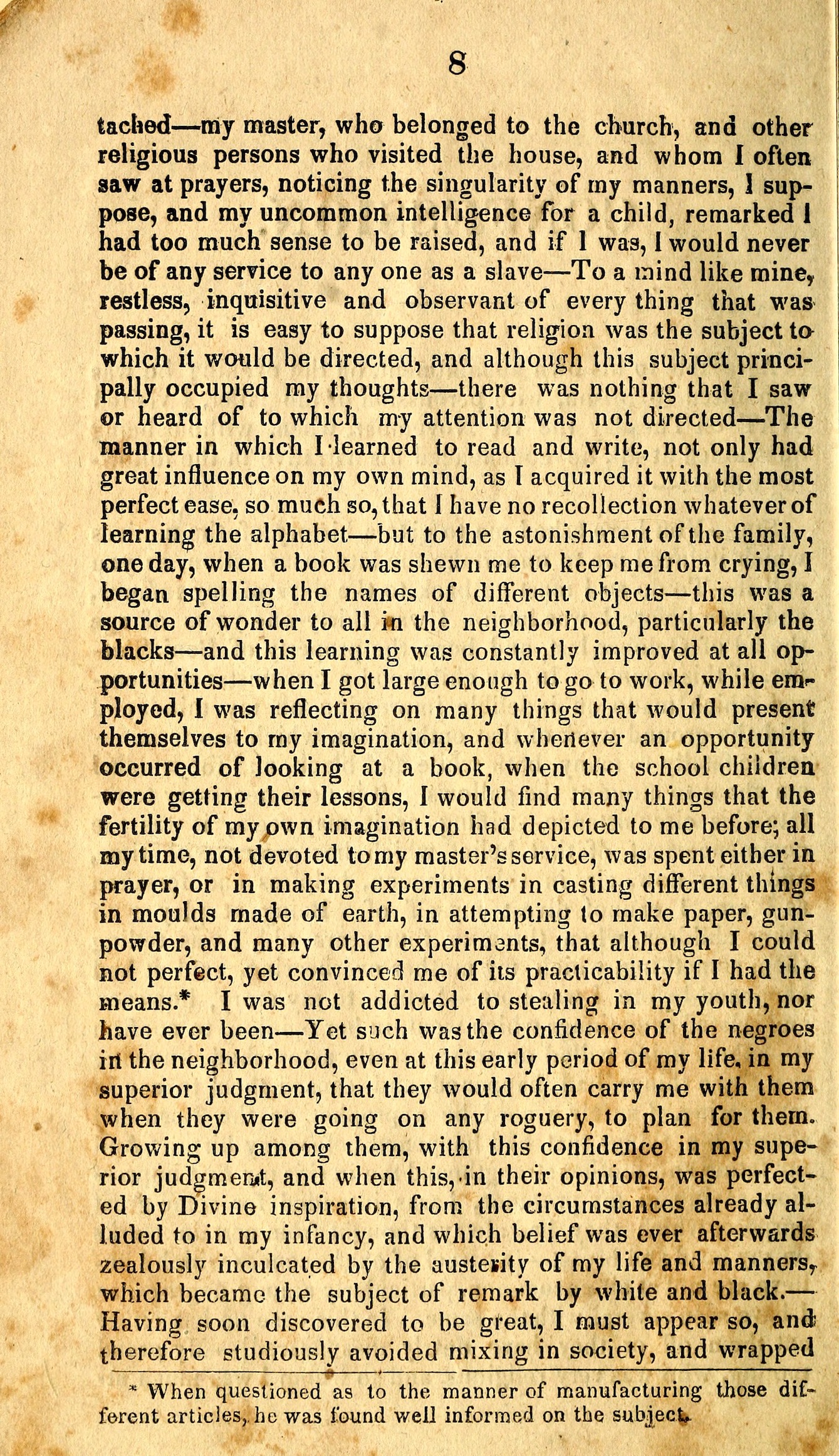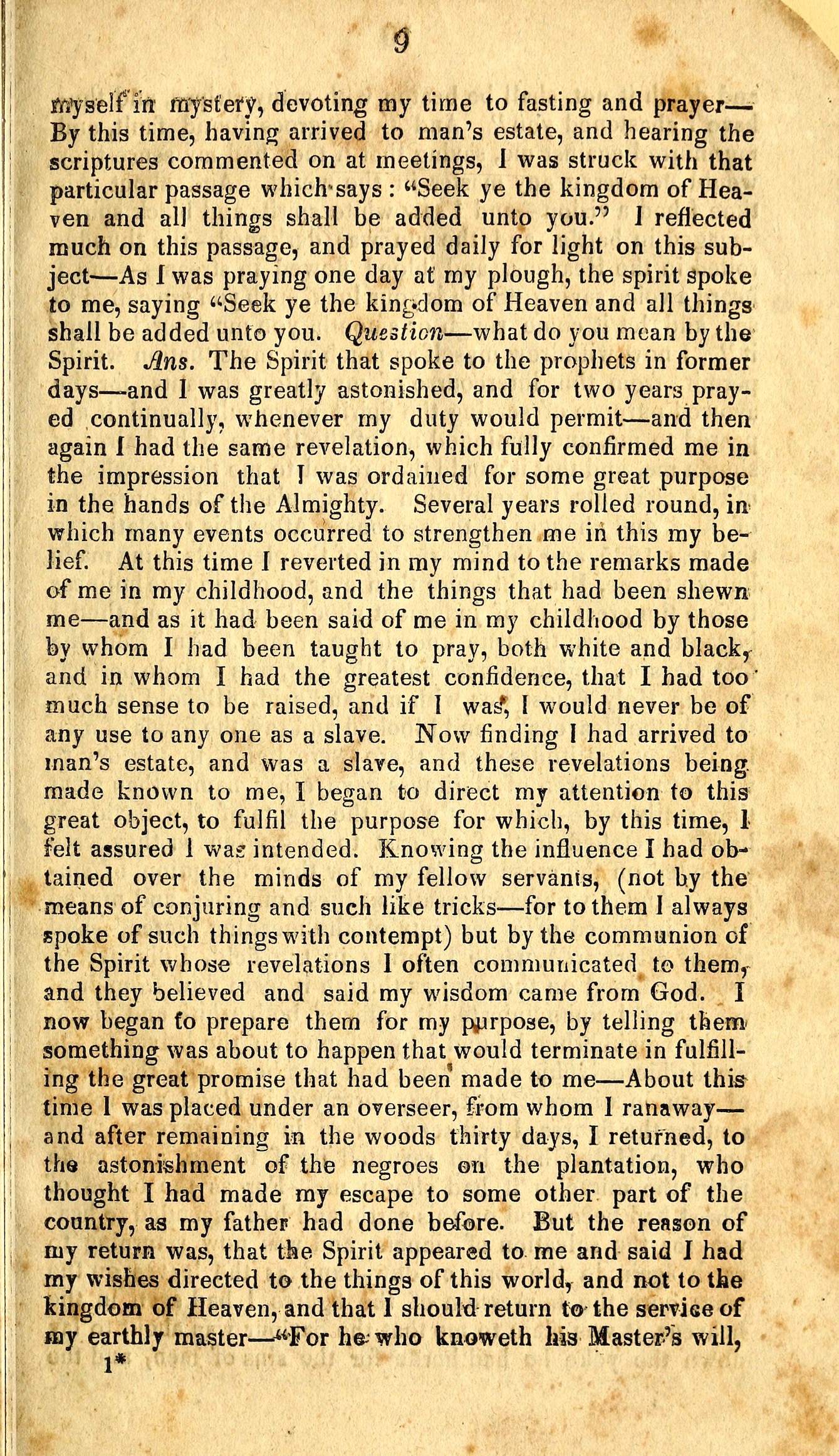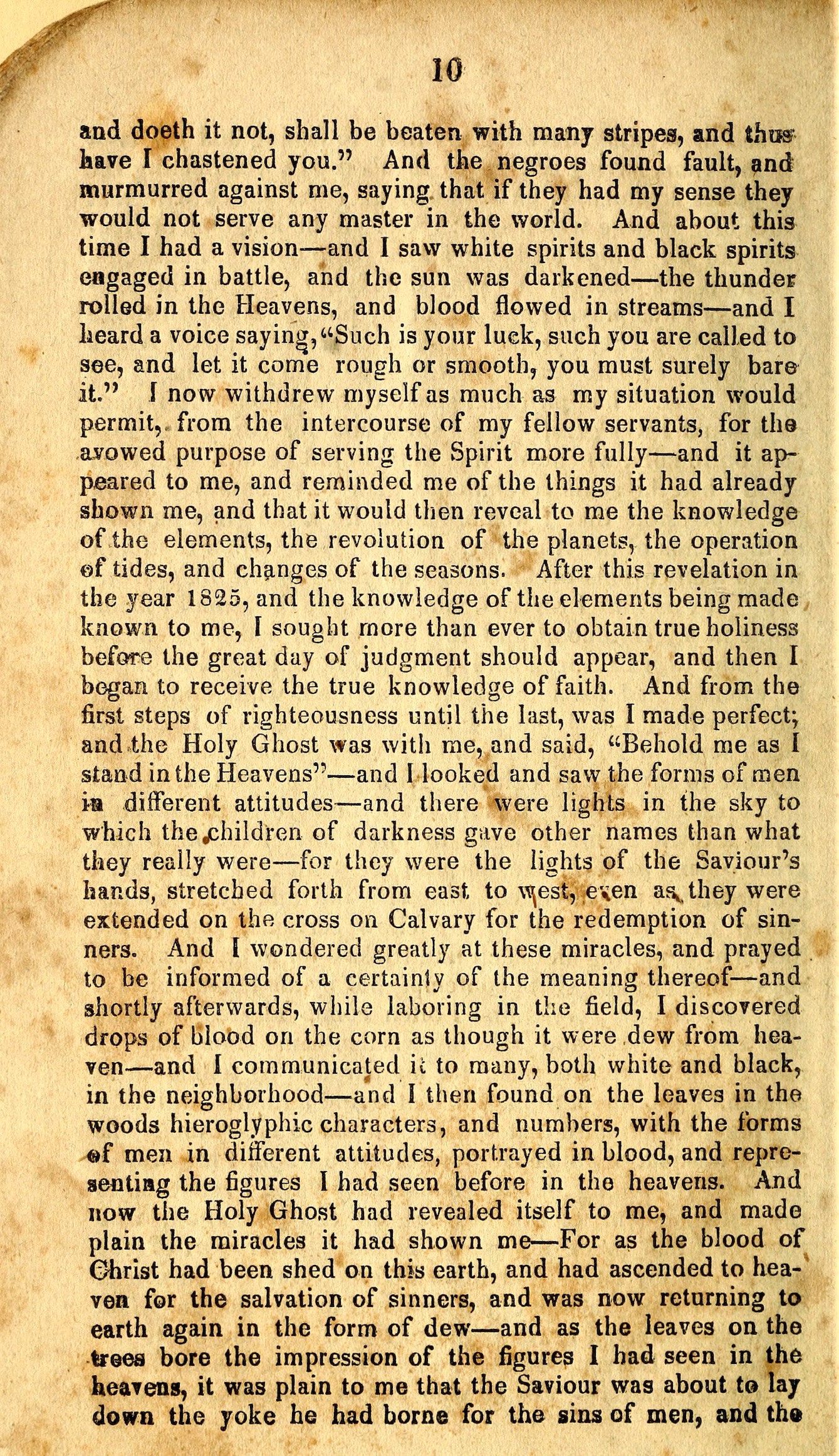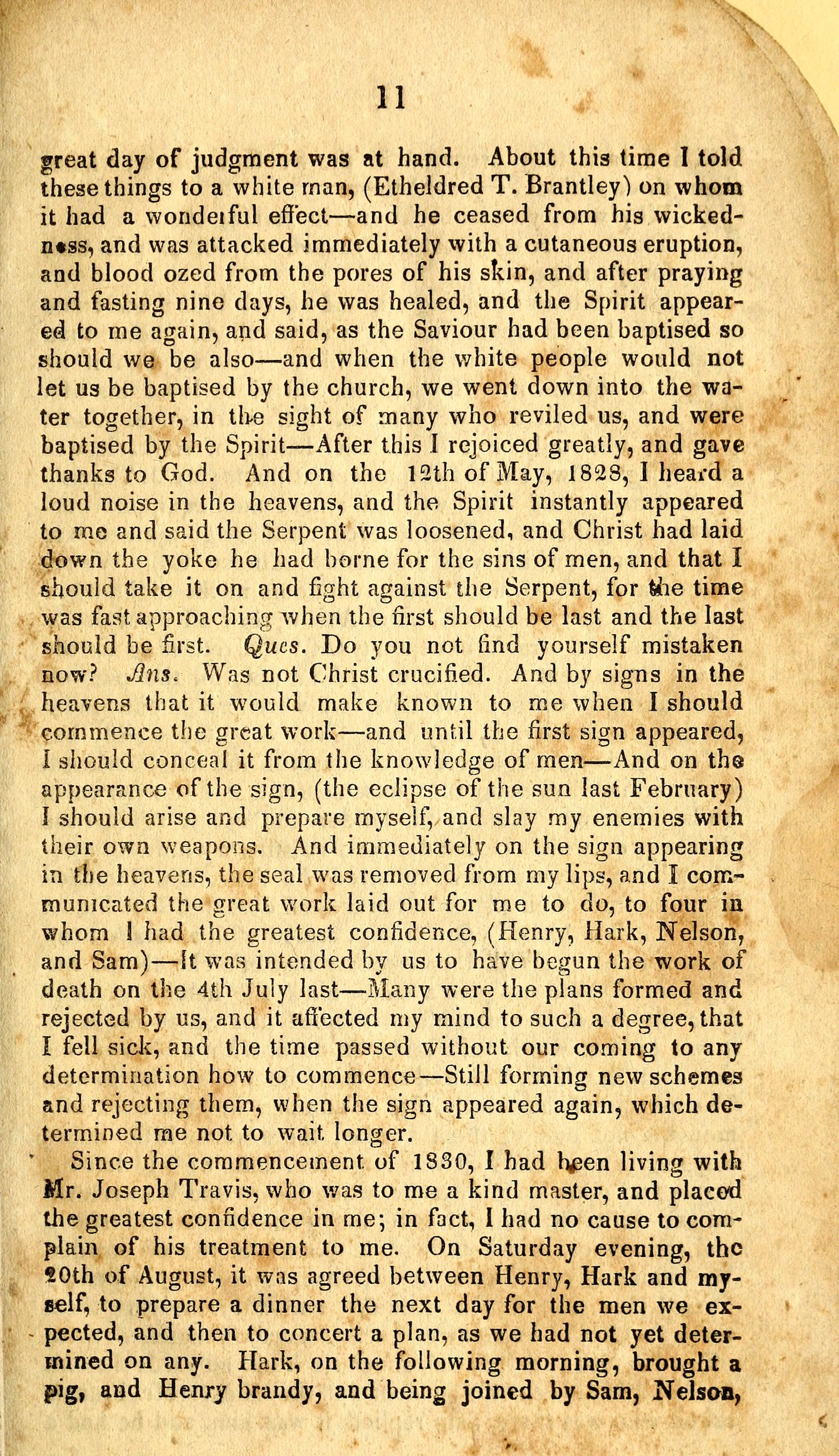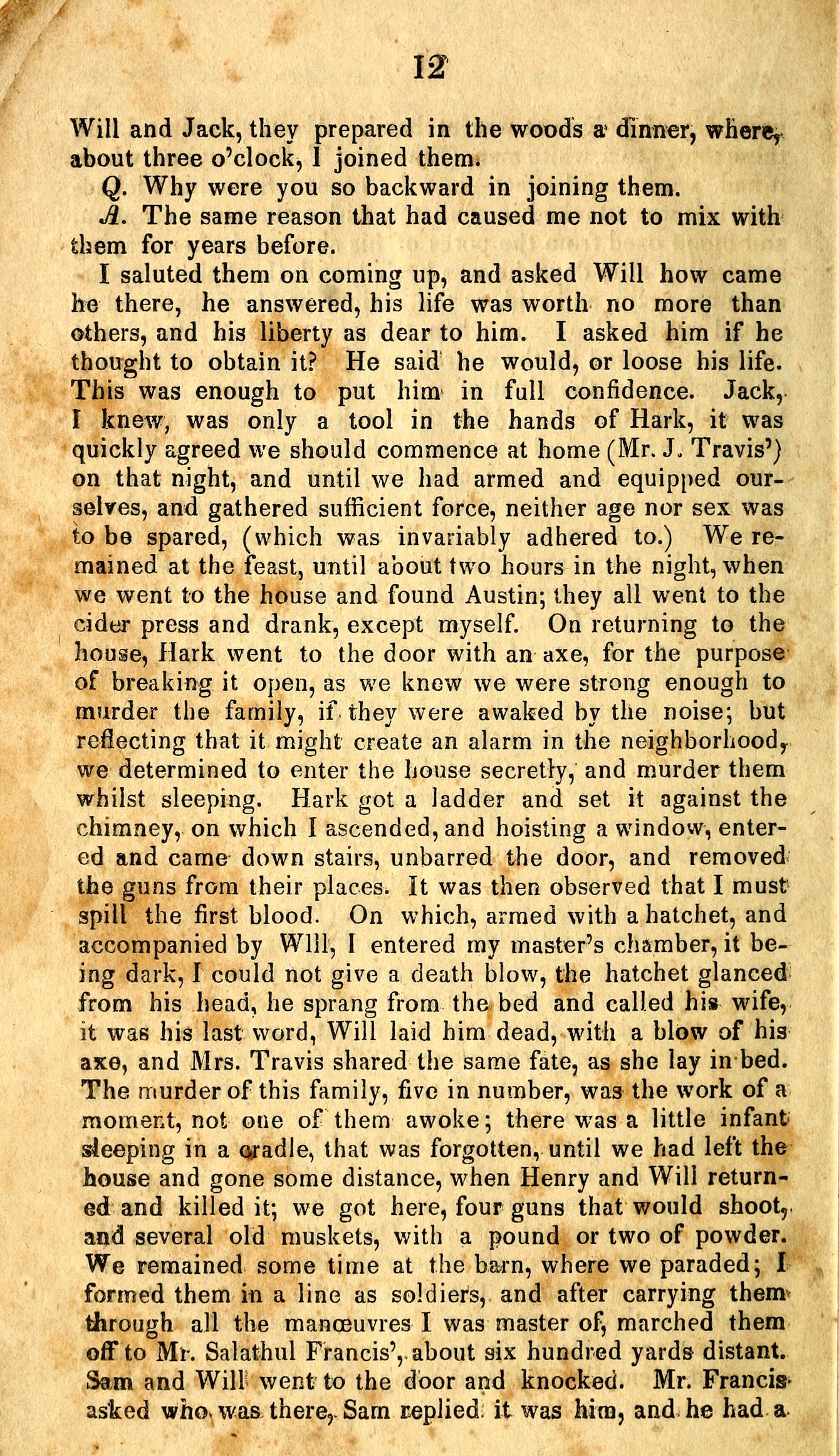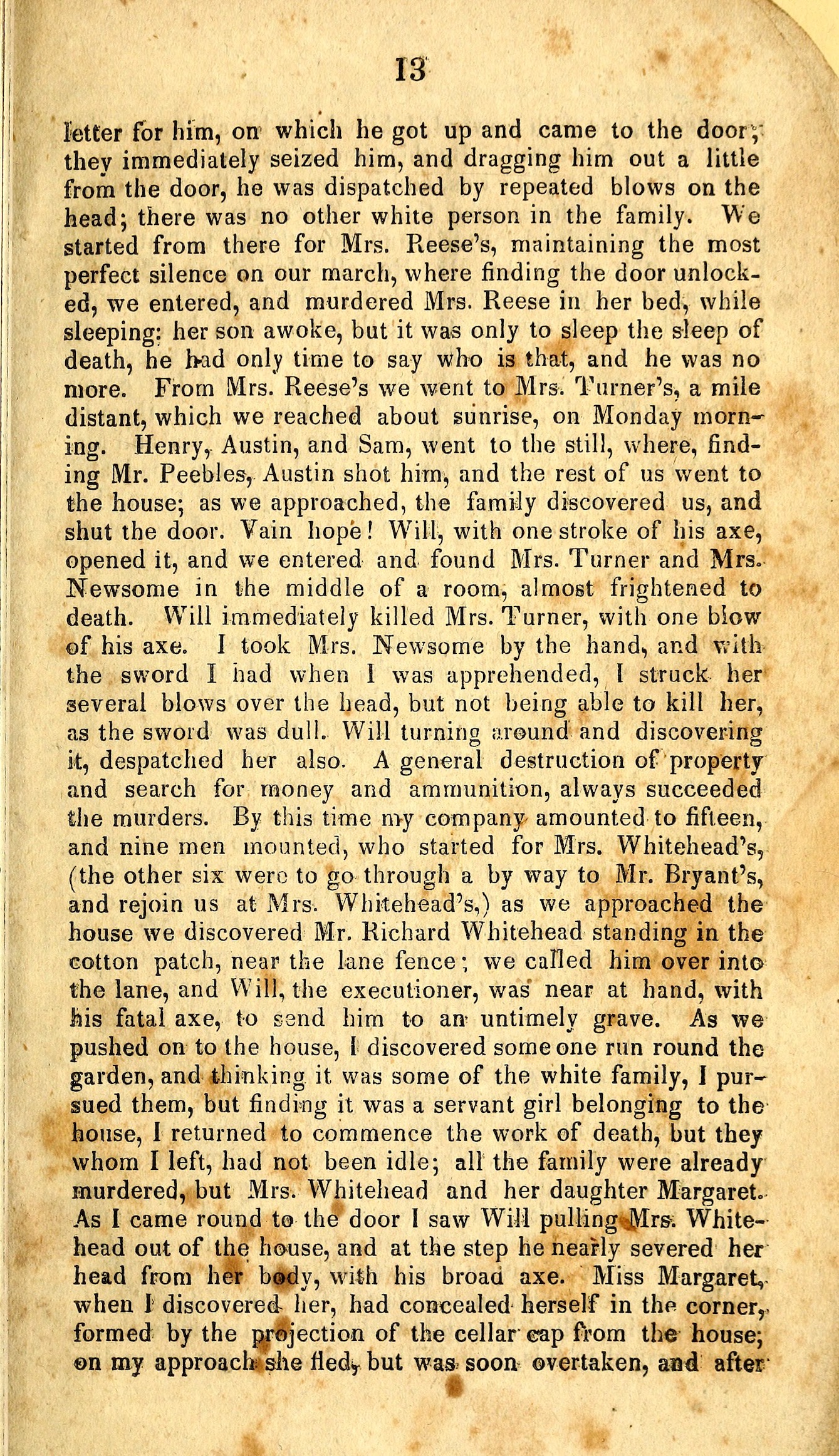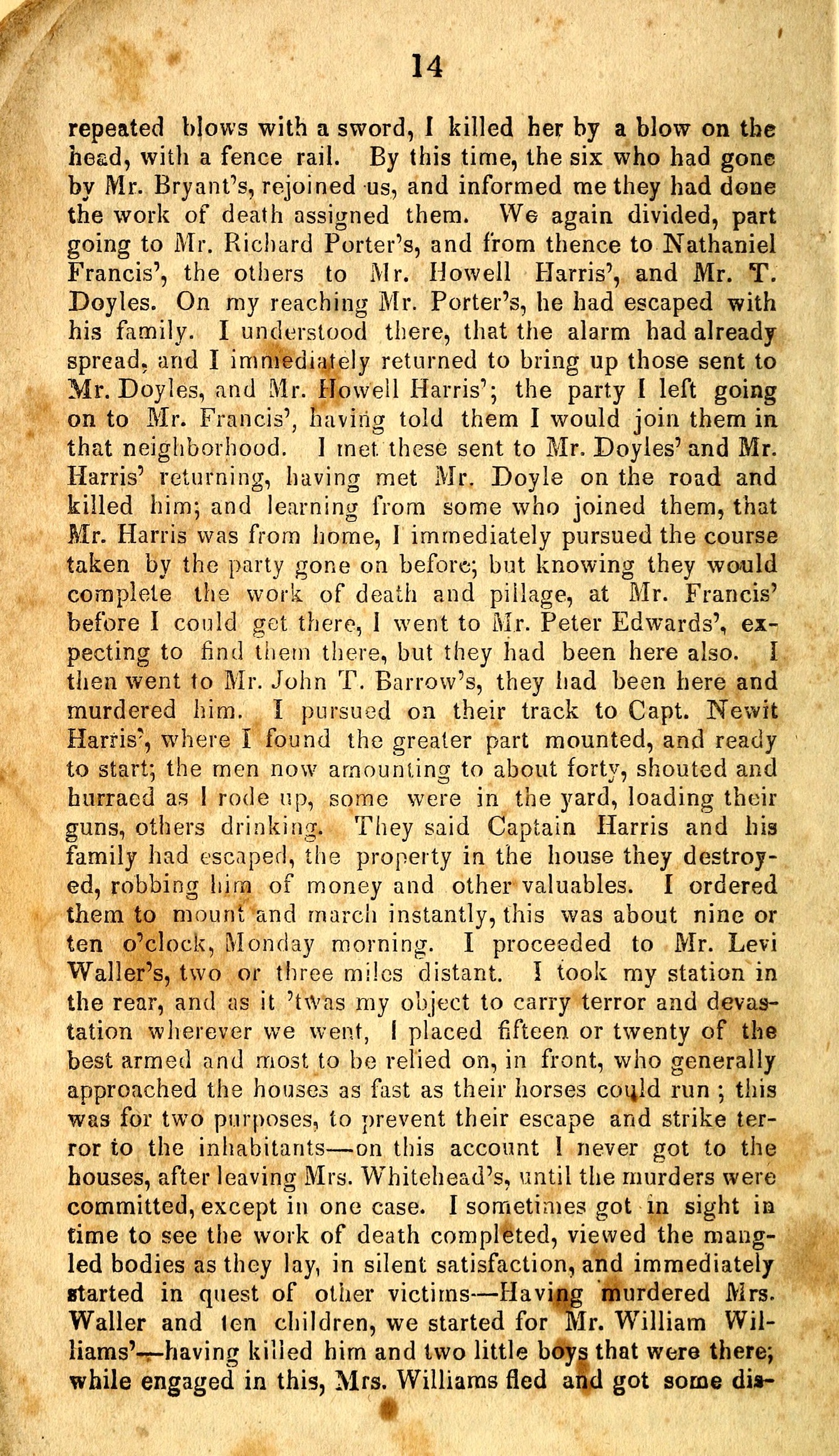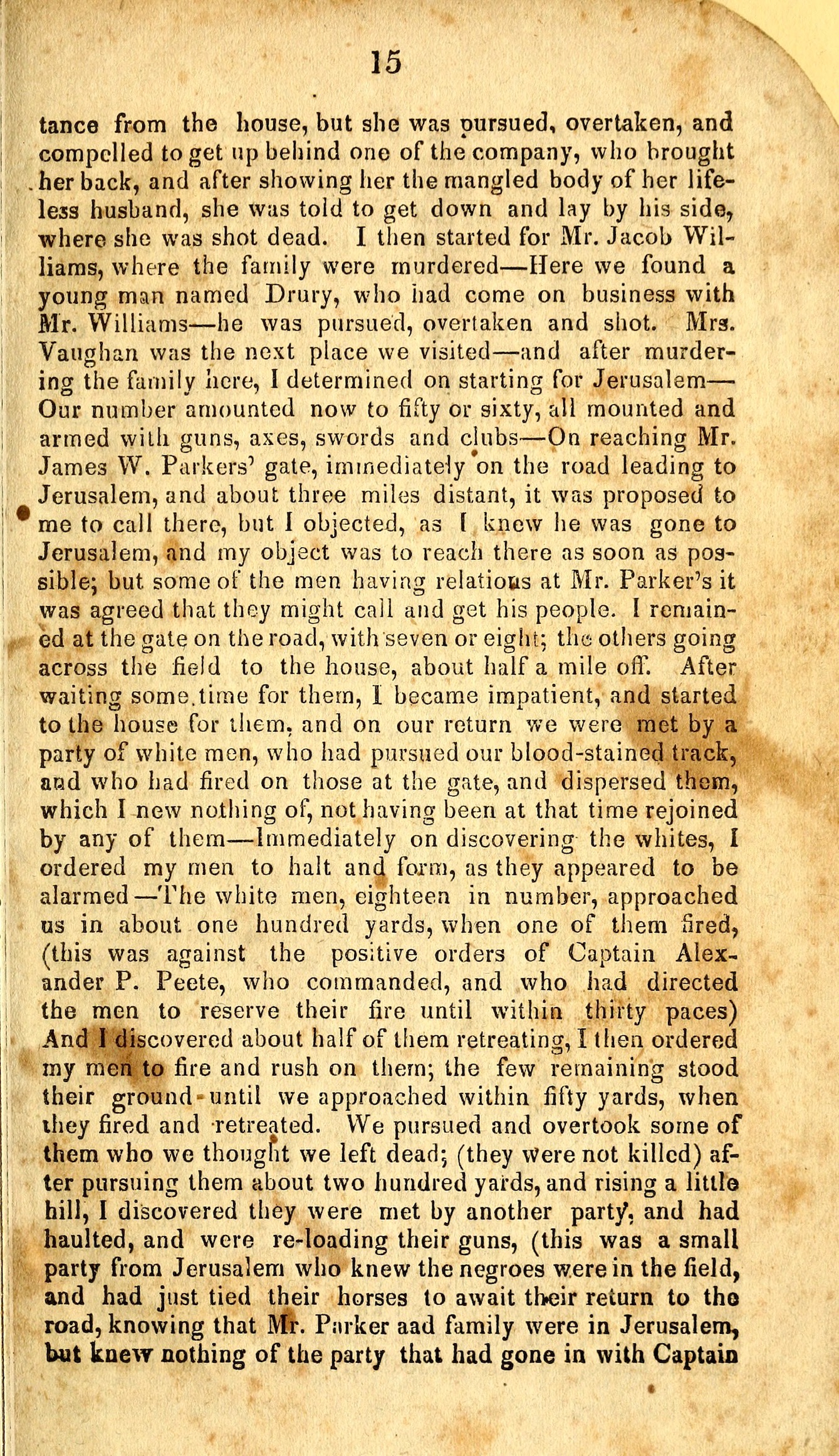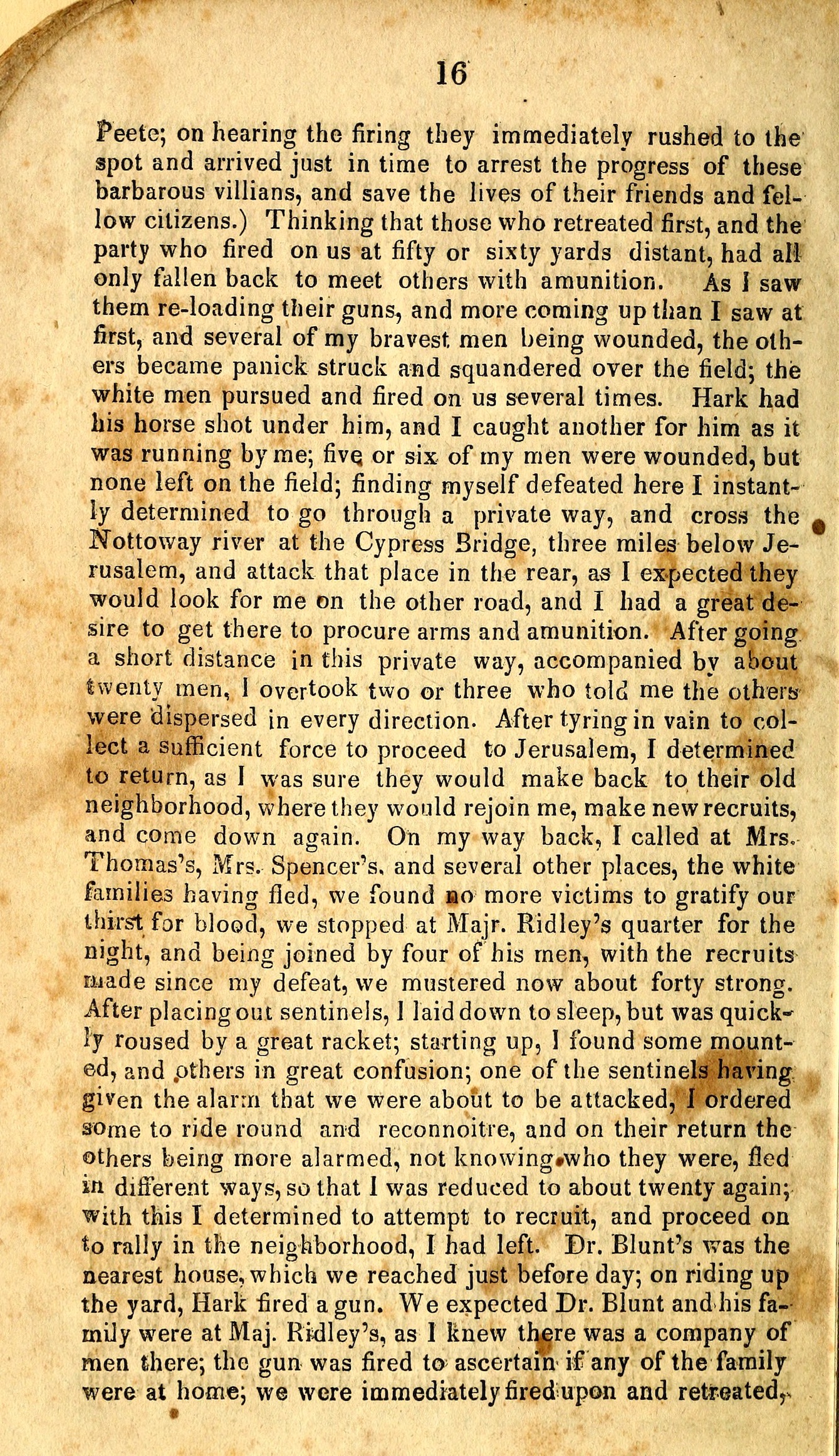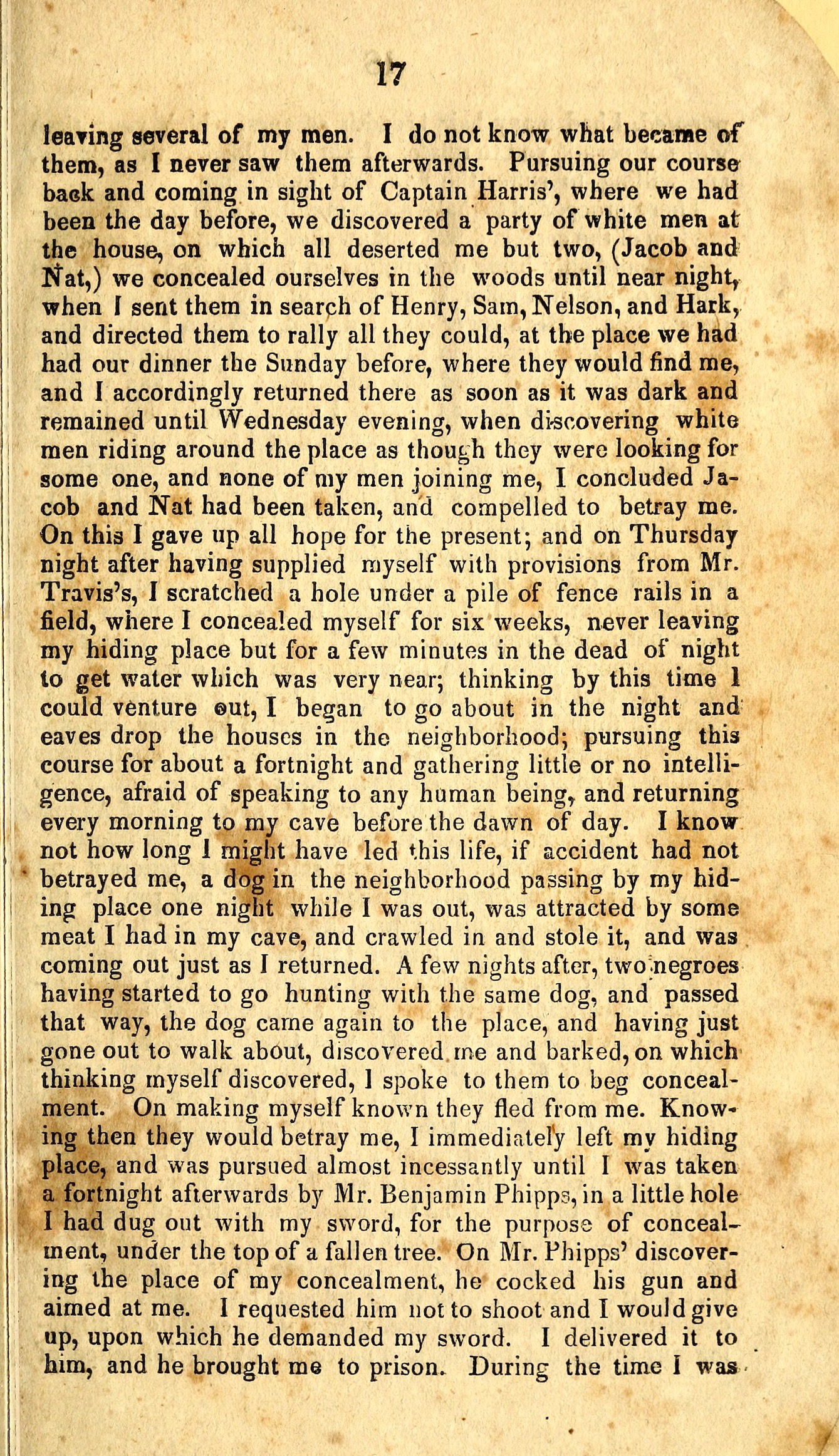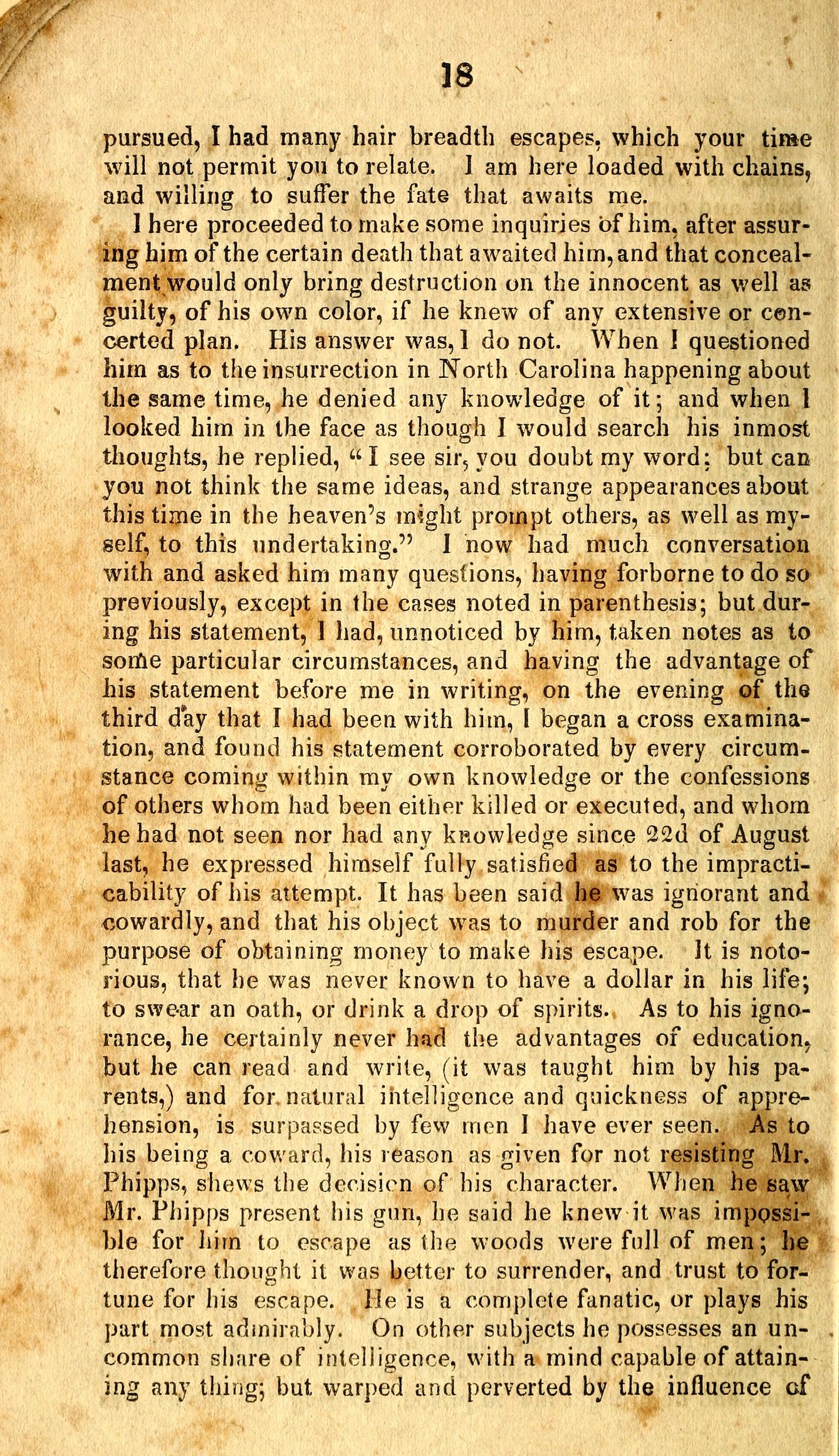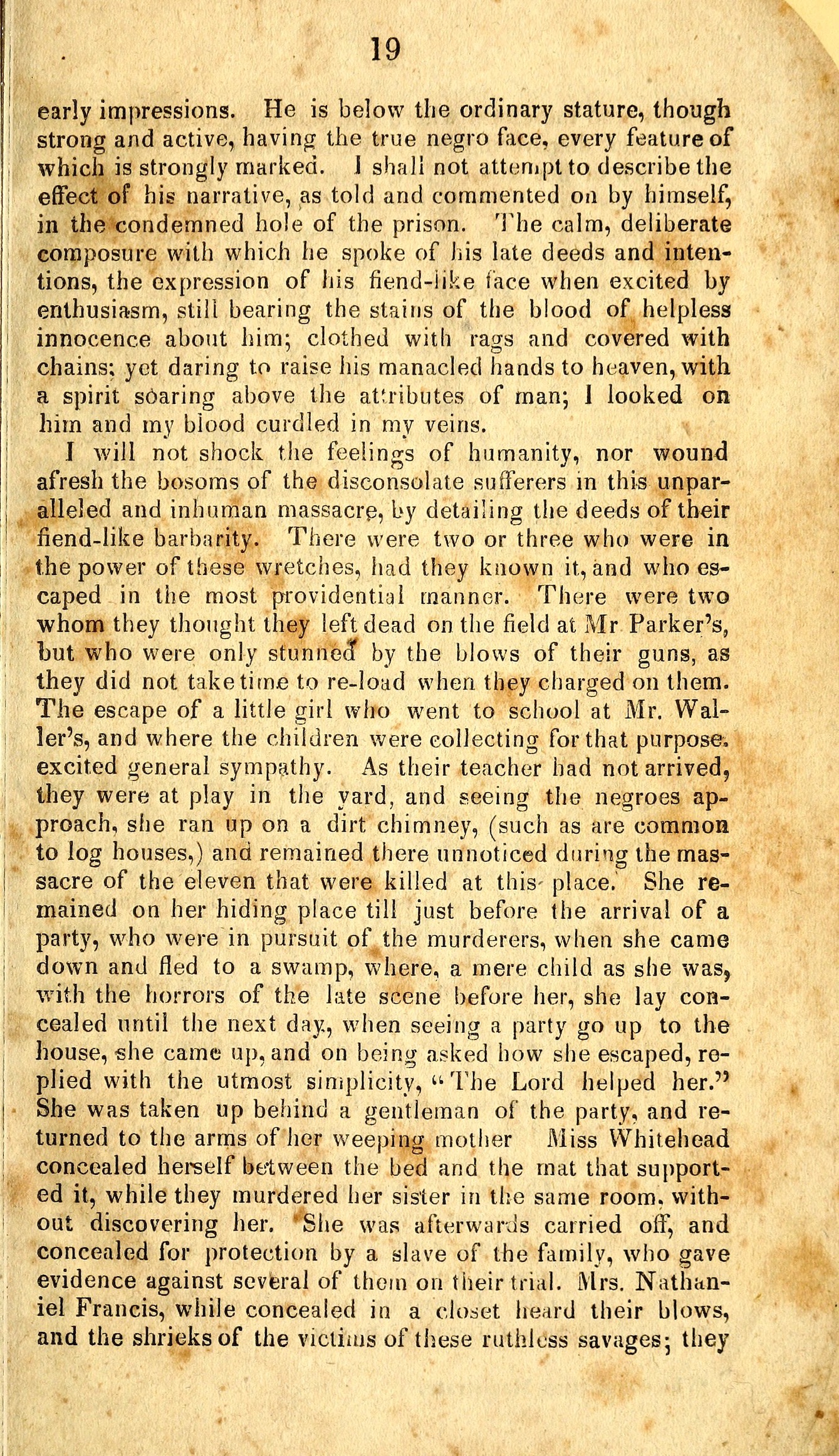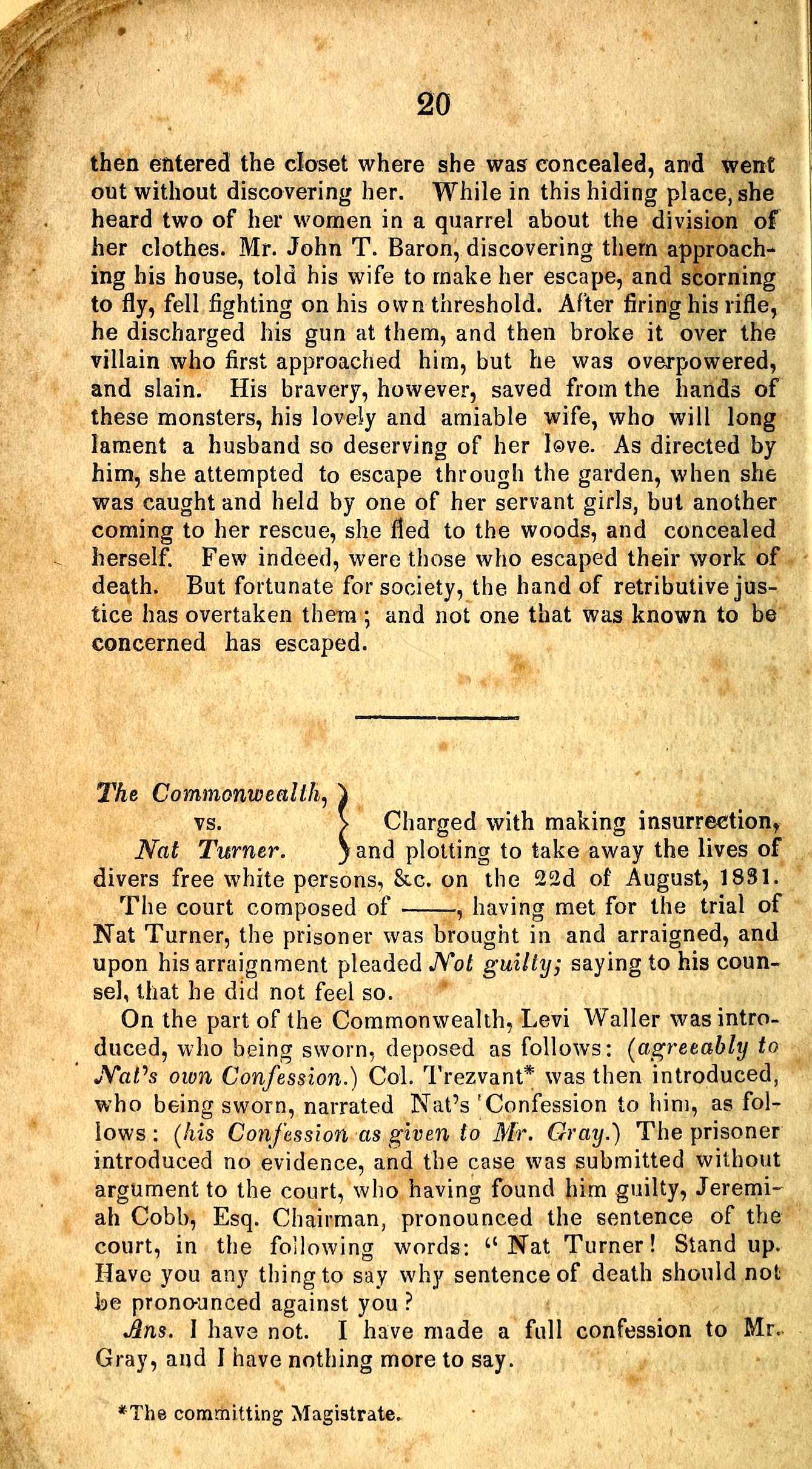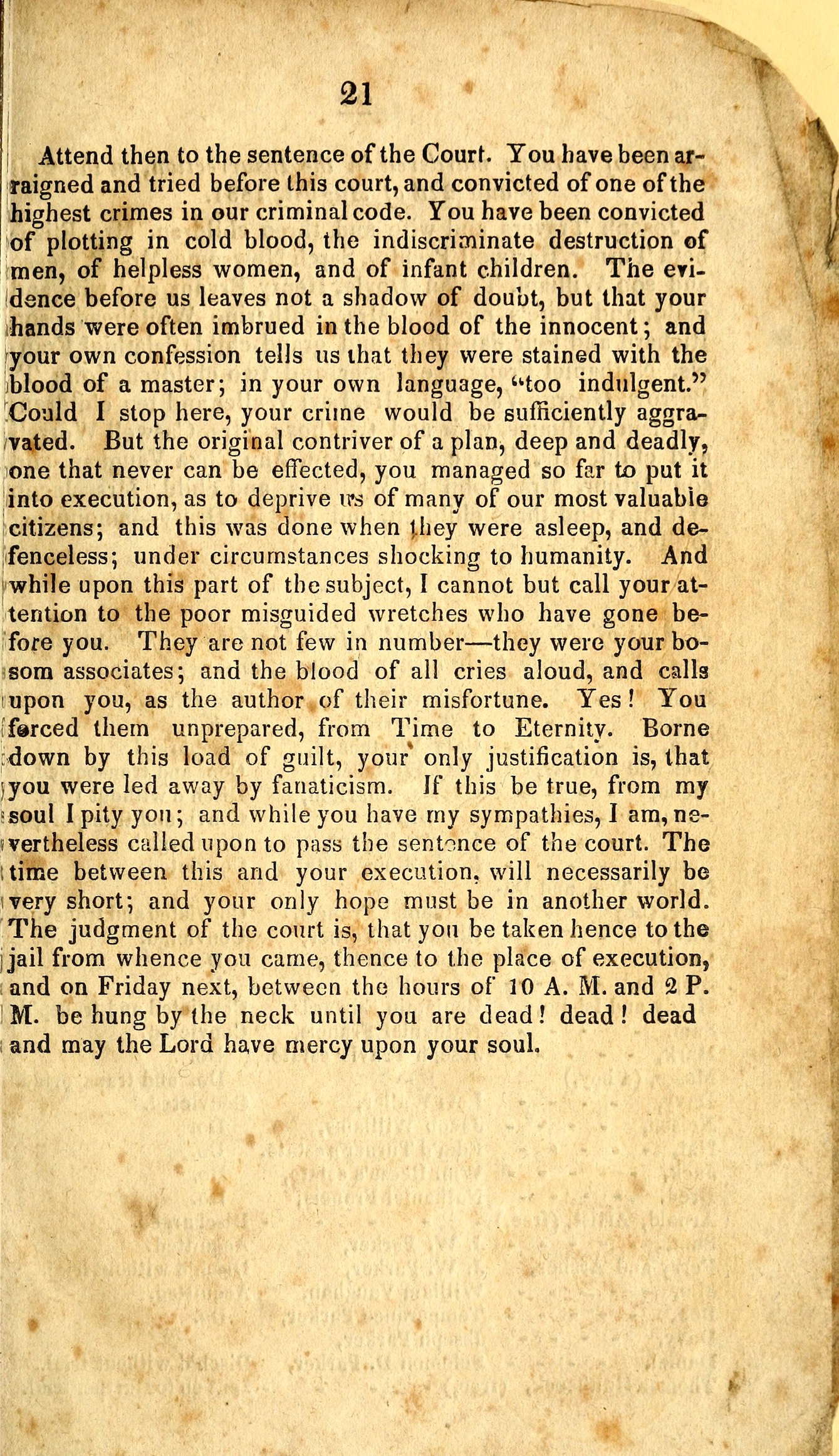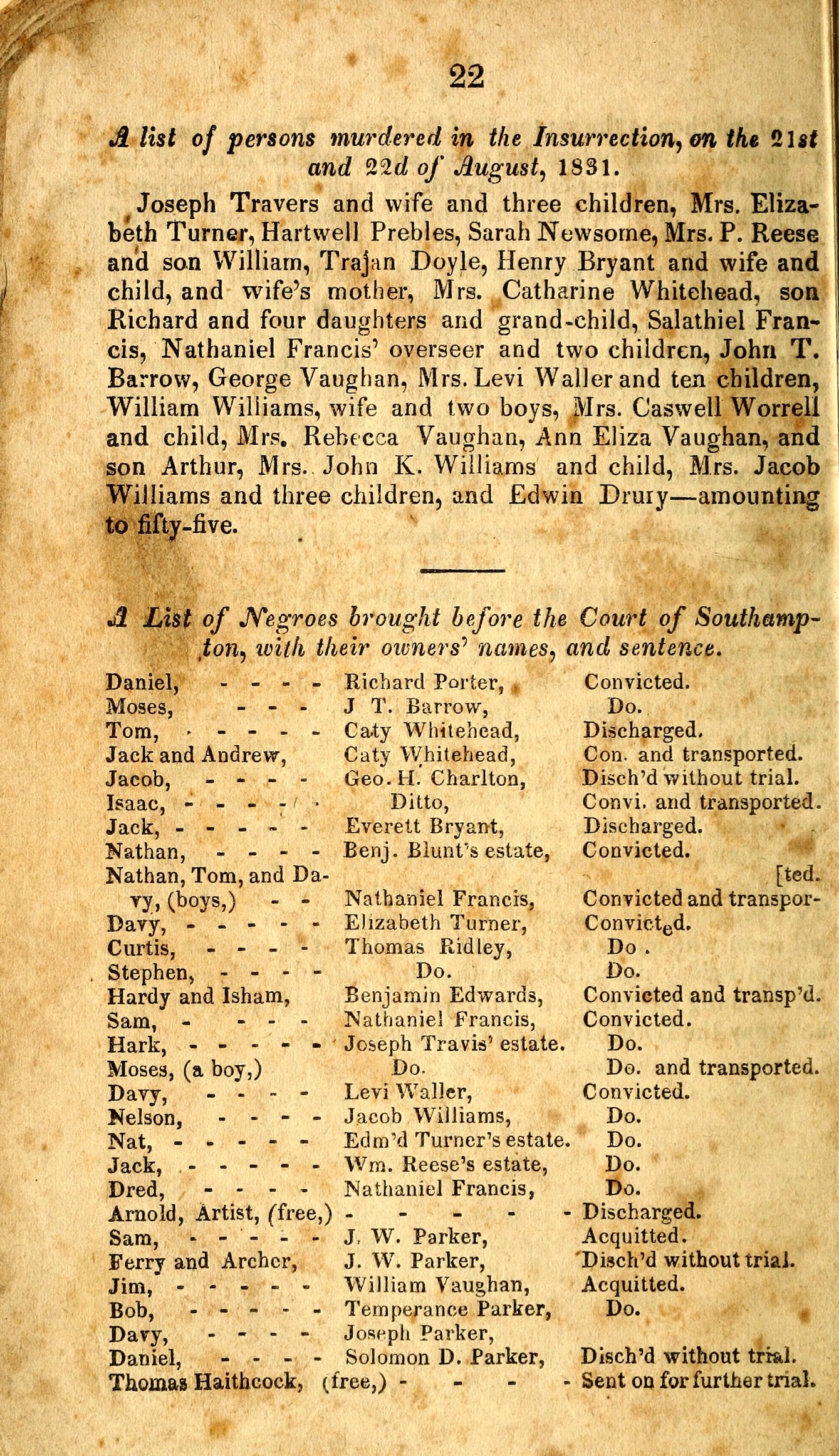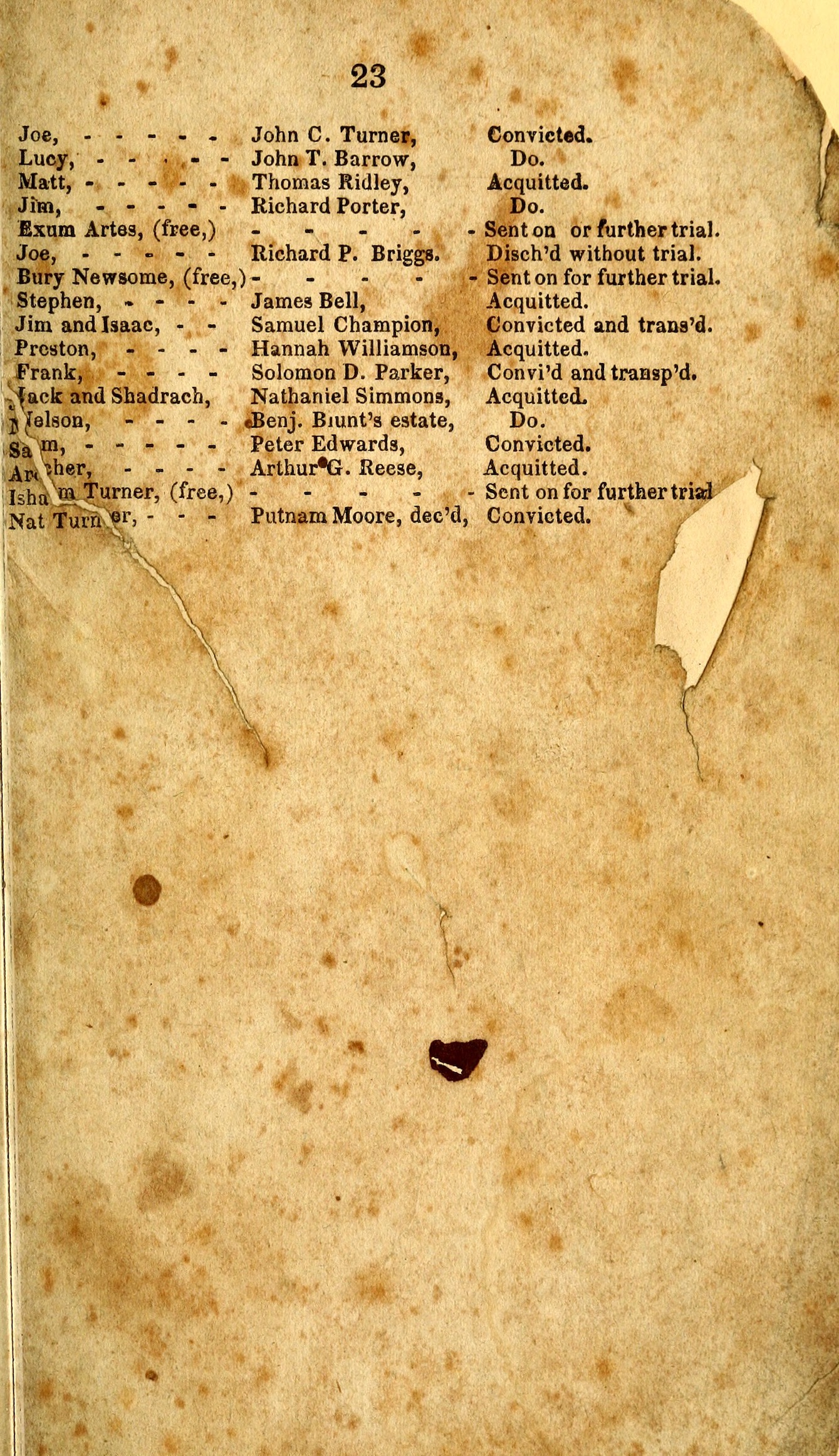THE
CONFESSIONS
OF
NAT TURNER, THE LEADER OF THE LATE
INSURRECTION IN SOUTHAMPTON, VA.
As fully and voluntarily made to
THOMAS R. GRAY
In the prison where he was confined, and acknowledged by
him to be such when read before the Court of Southampton;
with the certificate, under seal of
the Court convened at Jerusalem,
Nov. 5, 1831, for his trial.
ALSO, AN AUTHENTIC
ACCOUNT OF THE WHOLE INSURRECTION,
WITH LISTS OF THE WHITES WHO WERE MURDERED,
AND OF THE NEGROES BROUGHT BEFORE THE COURT OF
SOUTHAMPTON, AND THERE SENTENCED, &c.
Baltimore:
PUBLISHED BY THOMAS R. GRAY.
Lucas & Deaver, print.
1831.
Page verso
DISTRICT OF COLUMBIA, TO WIT:
Be it remembered, That on this tenth day of November, Anno Domini, eighteen hundred and thirty-one, Thomas R. Gray of the said District, deposited in this office the title of a book, which is in the words as following:
“The Confessions of Nat Turner, the leader of the late insurrection in Southampton, Virginia, as fully and voluntarily made to Thomas R. Gray, in the prison where he was confined, and acknowledged by him to be such when read before the Court of Southampton; with the certificate, under seal, of the Court convened at Jerusalem, November 5, 1831, for his trial. Also, an authentic account of the whole insurrection, with lists of the whites who were murdered, and of the negroes brought before the Court of Southampton, and there sentenced, &c. the right whereof he claims as proprietor, in conformity with an Act of Congress, entitled “An act to amend the several acts respecting Copy Rights.”
EDMUND J. LEE, Clerk of the District.
In testimony that the above is a true copy
from the record of the District Court for
the District of Columbia, I, Edmund I.
Lee, the Clerk thereof, have hereunto
set my hand and affixed the seal of my
office, this 10th day of November, 1831.
EDMUND J. LEE, C. D. C.
(Seal.)
TO THE PUBLIC.
The late insurrection in Southampton has greatly excited the public mind, and led to a thousand idle, exaggerated and mischievous reports. It is the first instance in our history of an open rebellion of the slaves, and attended with such atrocious circumstances of cruelty and destruction, as could not fail to leave a deep impression, not only upon the minds of the community where this fearful tragedy was wrought, but throughout every portion of our country, in which this population is to be found. Public curiosity has been on the stretch to understand the origin and progress of this dreadful conspiracy, and the motives which influences its diabolical actors. The insurgent slaves had all been destroyed, or apprehended, tried and executed, (with the exception of the leader,) without revealing any thing at all satisfactory, as to the motives which governed them, or the means by which they expected to accomplish their object. Every thing connected with this sad affair was wrapt in mystery, until Nat Turner, the leader of this ferocious band, whose name has resounded throughout our widely extended empire, was captured. This “great Bandit” was taken by a single individual, in a cave near the residence of his late owner, on Sunday, the thirtieth of October, without attempting to make the slightest resistance, and on the following day safely lodged in the jail of the County. His captor was Benjamin Phipps, armed with a shot gun well charged. Nat’s only weapon was a small light sword which he immediately surrendered, and begged that his life might be spared. Since his confinement, by permission of the Jailor, I have had ready access to him, and finding that he was willing to make a full and free confession of the origin, progress and consummation of the insurrectory movements of the slaves of which he was the contriver and head; I determined for the gratification of public curiosity to commit his
statements to writing, and publish them, with little or no variation, from his own words. That this is a faithful record of his confessions, the annexed certificate of the County Court of Southampton, will attest. They certainly bear one stamp of truth and sincerity. He makes no attempt (as all the other insurgents who were examined did,) to exculpate himself, but frankly acknowledges his full participation in all the guilt of the transaction. He was not only the contriver of the conspiracy, but gave the first blow towards its execution.
It will thus appear, that whilst every thing upon the surface of society wore a calm and peaceful aspect; whilst not one note of preparation was heard to warn the devoted inhabitants of woe and death, a gloomy fanatic was revolving in the recesses of his own dark, bewildered, and overwrought mind, schemes of indiscriminate massacre to the whites. [1] Schemes too fearfully executed as far as his fiendish band proceeded in their desolating march. No cry for mercy penetrated their flinty bosoms. No acts of remembered kindness made the least impression upon these remorseless murderers. Men, women and children, from hoary age to helpless infancy were involved in the same cruel fate. Never did a band of savages do their work of death more unsparingly. Apprehension for their own personal safety seems to have been the only principle of restraint in the whole course of their bloody proceedings.[2] And it is not the least remarkable feature in this horrid transaction, that a band actuated by such hellish purposes, should have resisted so feebly, when met by the whites in arms. Desperation alone, one would think, might have led to greater efforts. More than twenty of them attacked Dr. Blunt’s house on Tuesday morning, a little before day-break, defended by two men and three boys. They fled precipitately at the first fire; and their future plans of mischief, were entirely disconcerted and broken up. Escaping thence, each individual sought his own safety either in concealment, or by returning home, with the hope that his participation might escape detection, and all were shot down in the course of a few days, or captured and brought to trial and punishment. [3]Nat has survived all his followers, and the gallows will speedily close his career. His own account of the conspiracy is submitted to the public, without comment. It reads an awful, and it is hoped, a useful lesson, as to the operations of a mind like his, endeavoring to grapple with things beyond its reach. How it first became bewildered and confounded, and finally corrupted and led to
the conception and perpetration of the most atrocious and heart-rending deeds. It is calculated also to demonstrate the policy or our laws in restraint of this class of our population, and to induce all those entrusted with their execution, as well as our citizens generally, to see that they are strictly and rigidly enforced. Each particular community should look to its own safety, whilst the general guardians of the laws, keep a watchful eye over all. If Nat’s statements can be relied on, the insurrection in this county was entirely local, and his designs confided but to a few, and these in his immediate vicinity. It was not instigated by motives of revenge or sudden anger, but the results of long deliberation, and a settled purpose of mind. The offspring of gloomy fanaticism, acting upon materials but too well prepared for such impressions. It will be long remembered in the annals of our country, and many a mother as she presses her infant darling to her bosom, will shudder at the recollection of Nat Turner, and his band of ferocious miscreants.
Believing the following narrative, by removing doubts and conjectures from the public mind which otherwise must have remained, would give general satisfaction, it is respectfully submitted to the public by their ob’t serv’t,
T. R. GRAY.
Jerusalem, Southampton, Va. Nov. 5, 1831.
We the undersigned, members of the Court convened at Jerusalem, on Saturday, the 5th day of Nov. 1831, for the trial of Nat, alias Nat Turner, a negro slave, late the property of Putnam Moore, deceased, do hereby certify, that the confessions of Nat, to Thomas R. Gray, was read to him in our presence, and that Nat acknowledged the same to be full, free, and voluntary; and that furthermore, when called upon by the presiding Magistrate of the Court, to state if he had any thing to say, why sentence of death should not be passed upon him, replied he had nothing further than he had communicated to Mr. Gray. Given under our hands and seals at Jerusalem, this 5th day of November, 1831.
JEREMIAH COBB, [Seal.]
THOMAS PRETLOW, [Seal.]
JAMES W. PARKER, [Seal.]
CARR BOWERS, [Seal.]
SAMUEL B. HINES, [Seal.]
ORRIS A. BROWNE, [Seal.]
State of Virginia, Southampton County, to wit:
I, James Rochelle, Clerk of the County Court of Southampton in the State of Virginia, do hereby certify, that Jeremiah Cobb, Thomas Pretlow, James W. Parker, Carr Bowers, Samuel B. Hines, and Orris A. Browne, esqr’s are acting Justices of the Peace, in and for the County
aforesaid, and were members of the Court which convened at Jerusalem, on Saturday the 5th day of November, 1831, for the trial of Nat alias Nat Turner, a negro slave, late the property of Putnam Moore, deceased, who was tried and convicted, as an insurgent in the late insurrection in the county of Southampton aforesaid, and that full faith and credit are due, and ought to be given to their acts as Justices of the peace aforesaid.
In testimony whereof, I have hereunto set my hand and caused the seal of the Court aforesaid, to be affixed this 5th day of November, 1831.
JAMES ROCHELLE, C. S. C. C.
[Seal.]
CONFESSION.
Agreeable to his own appointment, on the evening he was committed to prison, with permission of the jailer, I visited NAT on Tuesday the 1st November, when, without being questioned at all, commenced his narrative in the following words:–
SIR,–You have asked me to give a history of the motives which induced me to undertake the late insurrection, as you call it–To do so I must go back to the days of my infancy, and even before I was born. I was thirty-one years of age the 2d of October last, and born the property of Benj. Turner, of this county. In my childhood a circumstance occurred which made an indelible impression on my mind, and laid the ground work of that enthusiasm, which has terminated so fatally to many, both white and black, and for which I am about to atone at the gallows. [4]
It is here necessary to relate this circumstance–trifling as it may seem, it was the commencement of that belief which has grown with time, and even now, sir, in this dungeon, helpless and forsaken as I am, I cannot divest myself of. Being at play with other children, when three or four years old, I was telling them something, which my mother overhearing, said it had happened before I was I born–I stuck to my story, however, and related somethings which went, in her opinion, to confirm it–others being called on were greatly astonished, knowing that these things had happened, and caused them to say in my hearing, I surely would be a prophet, as the Lord had shewn me things that had happened before my birth.[5] And my father and mother strengthened me in this my first impression, saying in my presence, I was intended for some great purpose, which they had always thought from certain marks on my head and breast–[a parcel of excrescences which I believe are not at all uncommon, particularly among negroes, as I have seen several with the same. In this case he has either cut them off or they have nearly disappeared]–My grand mother, who was very religious, and to whom I was much attached
–my master, who belonged to the church, and other religious persons who visited the house, and whom I often saw at prayers, noticing the singularity of my manners, I suppose, and my uncommon intelligence for a child, remarked I had too much sense to be raised, and if I was, I would never be of any service to any one as a slave [6]–To a mind like mine, restless, inquisitive and observant of every thing that was passing, it is easy to suppose that religion was the subject to which it would be directed, and although this subject principally occupied my thoughts–there was nothing that I saw or heard of to which my attention was not directed[7]–The manner in which I learned to read and write, not only had great influence on my own mind, as I acquired it with the most perfect ease, so much so, that I have no recollection whatever of learning the alphabet–but to the astonishment of the family, one day, when a book was shewn me to keep me from crying, I began spelling the names of different objects–this was a source of wonder to all in the neighborhood, particularly the blacks–and this learning was constantly improved at all opportunities–when I got large enough to go to work, while employed, I was reflecting on many things that would present themselves to my imagination, and whenever an opportunity occurred of looking at a book, when the school children were getting their lessons, I would find many things that the fertility of my own imagination had depicted to me before; all my time, not devoted to my master’s service, was spent either in prayer, or in making experiments in casting different things in moulds made of earth, in attempting to make paper, gunpowder, and many other experiments, that although I could not perfect, yet convinced me of its practicability if I had the means. * I was not addicted to stealing in my youth, nor have ever been–Yet such was the confidence of the negroes in the neighborhood, even at this early period of my life, in my superior judgment, that they would often carry me with them when they were going on any roguery, to plan for them. [8]Growing up among them, with this confidence in my superior judgment, and when this, in their opinions, was perfected by Divine inspiration, from the circumstances already alluded to in my infancy, and which belief was ever afterwards zealously inculcated by the austerity of my life and manners, which became the subject of remark by white and black.[9]— Having soon discovered to be great, I must appear so, and therefore studiously avoided mixing in society, and wrapped
* When questioned as to the manner of manufacturing those different articles, he was found well informed on the subject.
myself in mystery, devoting my time to fasting and prayer–By this time, having arrived to man’s estate, and hearing the scriptures commented on at meetings, I was struck with that particular passage which says : “Seek ye the kingdom of Heaven and all things shall be added unto you.” I reflected much on this passage, and prayed daily for light on this subject–As I was praying one day at my plough, the spirit spoke to me, saying “Seek ye the kingdom of Heaven and all things shall be added unto you.“ Question–what do you mean by the Spirit. Ans. The Spirit that spoke to the prophets in former days–and I was greatly astonished, and for two years prayed continually, whenever my duty would permit–and then again I had the same revelation, which fully confirmed me in the impression that I was ordained for some great purpose in the hands of the Almighty. Several years rolled round, in which many events occurred to strengthen me in this my belief. At this time I reverted in my mind to the remarks made of me in my childhood, and the things that had been shewn me–and as it had been said of me in my childhood by those by whom I had been taught to pray, both white and black, and in whom I had the greatest confidence, that I had too much sense to be raised, and if I was, I would never be of any use to any one as a slave. Now finding I had arrived to man’s estate, and was a slave, and these revelations being made known to me, I began to direct my attention to this great object, to fulfil the purpose for which, by this time, I felt assured I was intended. Knowing the influence I had obtained over the minds of my fellow servants, (not by the means of conjuring and such like tricks–for to them I always spoke of such things with contempt) but by the communion of the Spirit whose revelations I often communicated to them, and they believed and said my wisdom came from God. I now began to prepare them for my purpose, by telling them something was about to happen that would terminate in fulfilling the great promise that had been made to me [10]–About this time I was placed under an overseer, from whom I ranaway – and after remaining in the woods thirty days, I returned, to the astonishment of the negroes on the plantation, who thought I had made my escape to some other part of the country, as my father had done before. But the reason of my return was, that the Spirit appeared to me and said I had my wishes directed to the things of this world, and not to the kingdom of Heaven, and that I should return to the service of my earthly master[11]–“For he who knoweth his Master’s will,
and doeth it not, shall be beaten with many stripes, and thus, have I chastened you.” And the negroes found fault, and murmurred against me, saying that if they had my sense they would not serve any master in the world. And about this time I had a vision–and I saw white spirits and black spirits engaged in battle, and the sun was darkened–the thunder rolled in the Heavens, and blood flowed in streams–and I heard a voice saying, “Such is your luck, such you are called to see, and let it come rough or smooth, you must surely bare it.”[12] I now withdrew myself as much as my situation would permit, from the intercourse of my fellow servants, for the avowed purpose of serving the Spirit more fully–and it appeared to me, and reminded me of the things it had already shown me, and that it would then reveal to me the knowledge of the elements, the revolution of the planets, the operation of tides, and changes of the seasons. After this revelation in the year 1825, and the knowledge of the elements being made known to me, I sought more than ever to obtain true holiness before the great day of judgment should appear, and then I began to receive the true knowledge of faith. And from the first steps of righteousness until the last, was I made perfect; and the Holy Ghost was with me, and said, “Behold me as I stand in the Heavens”–and I looked and saw the forms of men in different attitudes–and there were lights in the sky to which the children of darkness gave other names than what they really were–for they were the lights of the Saviour’s hands, stretched forth from east to west, even as they were extended on the cross on Calvary for the redemption of sinners. And I wondered greatly at these miracles, and prayed to be informed of a certainty of the meaning thereof–and shortly afterwards, while laboring in the field, I discovered drops of blood on the corn as though it were dew from heaven– and I communicated it to many, both white and black, in the neighborhood–and I then found on the leaves in the woods hieroglyphic characters, and numbers, with the forms of men in different attitudes, portrayed in blood, and representing the figures I had seen before in the heavens. And now the Holy Ghost had revealed itself to me, and made plain the miracles it had shown me–For as the blood of Christ had been shed on this earth, and had ascended to heaven for the salvation of sinners, and was now returning to earth again in the form of dew–and as the leaves on the trees bore the impression of the figures I had seen in the heavens, it was plain to me that the Saviour was about to lay down the yoke he had borne for the sins of men, and the
great day of judgment was at hand.[13]About this time I told these things to a white man, (Etheldred T. Brantley) on whom it had a wonderful effect–and he ceased from his wickedness, and was attacked immediately with a cutaneous eruption, and blood ozed from the pores of his skin, and after praying and fasting nine days, he was healed, and the Spirit appeared to me again, and said, as the Saviour had been baptised so should we be also–and when the white people would not let us be baptised by the church, we went down into the water together, in the sight of many who reviled us, and were baptised by the Spirit–After this I rejoiced greatly, and gave thanks to God. And on the 12th of May, 1828, I heard a loud noise in the heavens, and the Spirit instantly appeared to me and said the Serpent was loosened, and Christ had laid down the yoke he had borne for the sins of men, and that I should take it on and fight against the Serpent, for the time was fast approaching when the first should be last and the last should be first.[14] Ques. Do you not find yourself mistaken now? Ans. Was not Christ crucified. And by signs in the heavens that it would make known to me when I should commence the great work–and until the first sign appeared, I should conceal it from the knowledge of men–And on the appearance of the sign, (the eclipse of the sun last February) I should arise and prepare myself, and slay my enemies with their own weapons. And immediately on the sign appearing in the heavens, the seal was removed from my lips, and I communicated the great work laid out for me to do, to four in whom I had the greatest confidence, (Henry, Hark, Nelson, and Sam)[15]–It was intended by us to have begun the work of death on the 4th July last–Many were the plans formed and rejected by us, and it affected my mind to such a degree, that I fell sick, and the time passed without our coming to any determination how to commence–Still forming new schemes and rejecting them, when the sign appeared again, which determined me not to wait longer.
Since the commencement of 1830, I had been living with Mr. Joseph Travis, who was to me a kind master, and placed the greatest confidence in me; in fact, I had no cause to complain of his treatment to me. On Saturday evening, the 20th of August, it was agreed between Henry, Hark and myself, to prepare a dinner the next day for the men we expected, and then to concert a plan, as we had not yet determined on any. Hark, on the following morning, brought a pig, and Henry brandy, and being joined by Sam, Nelson,
Will and Jack, they prepared in the woods a dinner, where, about three o’clock, I joined them.
Q. Why were you so backward in joining them.
A. The same reason that had caused me not to mix with them for years before.
I saluted them on coming up, and asked Will how came he there, he answered, his life was worth no more than others, and his liberty as dear to him. I asked him if he thought to obtain it? He said he would, or loose his life. This was enough to put him in full confidence. Jack, I knew, was only a tool in the hands of Hark, it was quickly agreed we should commence at home (Mr. J. Travis’) on that night, and until we had armed and equipped ourselves, and gathered sufficient force, neither age nor sex was to be spared, (which was invariably adhered to.) We remained at the feast until about two hours in the night, when we went to the house and found Austin; they all went to the cider press and drank, except myself. On returning to the house, Hark went to the door with an axe, for the purpose of breaking it open, as we knew we were strong enough to murder the family, if they were awaked by the noise; but reflecting that it might create an alarm in the neighborhood, we determined to enter the house secretly, and murder them whilst sleeping. Hark got a ladder and set it against the chimney, on which I ascended, and hoisting a window, entered and came down stairs, unbarred the door, and removed the guns from their places. It was then observed that I must spill the first blood. On which, armed with a hatchet, and accompanied by Will, I entered my master’s chamber, it being dark, I could not give a death blow, the hatchet glanced from his head, he sprang from the bed and called his wife, it was his last word, Will laid him dead, with a blow of his axe, and Mrs. Travis shared the same fate, as she lay in bed. The murder of this family, five in number, was the work of a moment, not one of them awoke; there was a little infant sleeping in a cradle, that was forgotten, until we had left the house and gone some distance, when Henry and Will returned and killed it; we got here, four guns that would shoot, and several old muskets, with a pound or two of powder.[16] We remained some time at the barn, where we paraded; I formed them in a line as soldiers, and after carrying them through all the manoeuvres I was master of, marched them off to Mr. Salathul Francis’, about six hundred yards distant. Sam and Will went to the door and knocked. Mr. Francis asked who was there, Sam replied, it was him, and he had a
letter for him, on which he got up and came to the door, they immediately seized him, and dragging him out a little from the door, he was dispatched by repeated blows on the head; there was no other white person in the family. We started from there for Mrs. Reese’s, maintaining the most perfect silence on our march, where finding the door unlocked, we entered, and murdered Mrs. Reese in her bed, while sleeping; her son awoke, but it was only to sleep the sleep of death, he had only time to say who is that, and he was no more. From Mrs. Reese’s we went to Mrs. Turner’s, a mile distant, which we reached about sunrise, on Monday morning. Henry, Austin, and Sam, went to the still, where, finding Mr. Peebles, Austin shot him, and the rest of us went to the house; as we approached, the family discovered us, and shut the door. Vain hope! Will, with one stroke of his axe, opened it, and we entered and found Mrs. Turner and Mrs. Newsome in the middle of a room, almost frightened to death. Will immediately killed Mrs. Turner, with one blow of his axe. I took Mrs. Newsome by the hand, and with the sword I had when I was apprehended, I struck her several blows over the head, but not being able to kill her, as the sword was dull. Will turning around and discovering it, despatched her also. A general destruction of property and search for money and ammunition, always succeeded the murders. By this time my company amounted to fifteen, and nine men mounted, who started for Mrs. Whitehead’s, (the other six were to go through a by way to Mr. Bryant’s and rejoin us at Mrs. Whitehead’s,) as we approached the house we discovered Mr. Richard Whitehead standing in the cotton patch, near the lane fence; we called him over into the lane, and Will, the executioner, was near at hand, with his fatal axe, to send him to an untimely grave. As we pushed on to the house, I discovered some one run round the garden, and thinking it was some of the white family, I pursued them, but finding it was a servant girl belonging to the house, I returned to commence the work of death, but they whom I left, had not been idle; all the family were already murdered, but Mrs. Whitehead and her daughter Margaret. As I came round to the door I saw Will pulling Mrs. Whitehead out of the house, and at the step he nearly severed her head from her body, with his broad axe. Miss Margaret, when I discovered her, had concealed herself in the corner, formed by the projection of the cellar cap from the house; on my approach she fled, but was soon overtaken, and after
repeated blows with a sword, I killed her by a blow on the head, with a fence rail. By this time, the six who had gone by Mr. Bryant’s, rejoined us, and informed me they had done the work of death assigned them. We again divided, part going to Mr. Richard Porter’s, and from thence to Nathaniel Francis’, the others to Mr. Howell Harris’, and Mr. T. Doyles. On my reaching Mr. Porter’s, he had escaped with his family. I understood there, that the alarm had already spread, and I immediately returned to bring up those sent to Mr. Doyles, and Mr. Howell Harris’; the party I left going on to Mr. Francis’, having told them I would join them in that neighborhood. I met these sent to Mr. Doyles’ and Mr. Harris’ returning, having met Mr. Doyle on the road and killed him; and learning from some who joined them, that Mr. Harris was from home, I immediately pursued the course taken by the party gone on before; but knowing they would complete the work of death and pillage, at Mr. Francis’ before I could there, I went to Mr. Peter Edwards’, expecting to find them there, but they had been here also. I then went to Mr. John T. Barrow’s, they had been here and murdered him. I pursued on their track to Capt. Newit Harris’, where I found the greater part mounted, and ready to start; the men now amounting to about forty, shouted and hurraed as I rode up, some were in the yard, loading their guns, others drinking. They said Captain Harris and his family had escaped, the property in the house they destroyed, robbing him of money and other valuables. I ordered them to mount and march instantly, this was about nine or ten o’clock, Monday morning. I proceeded to Mr. Levi Waller’s, two or three miles distant. I took my station in the rear, and as it ’twas my object to carry terror and devastation wherever we went, I placed fifteen or twenty of the best armed and most to be relied on, in front, who generally approached the houses as fast as their horses could run; this was for two purposes, to prevent their escape and strike terror to the inhabitants–on this account I never got to the houses, after leaving Mrs. Whitehead’s, until the murders were committed, except in one case. I sometimes got in sight in time to see the work of death completed, viewed the mangled bodies as they lay, in silent satisfaction, and immediately started in quest of other victims–Having murdered Mrs. Waller and ten children, we started for Mr. William Williams’ –having killed him and two little boys that were there; while engaged in this, Mrs. Williams fled and got some distance
from the house, but she was pursued, overtaken, and compelled to get up behind one of the company, who brought her back, and after showing her the mangled body of her lifeless husband, she was told to get down and lay by his side, where she was shot dead. I then started for Mr. Jacob Williams, where the family were murdered–Here we found a young man named Drury, who had come on business with Mr. Williams–he was pursued, overtaken and shot. Mrs. Vaughan was the next place we visited–and after murdering the family here, I determined on starting for Jerusalem– Our number amounted now to fifty or sixty, all mounted and armed with guns, axes, swords and clubs–On reaching Mr. James W. Parkers’ gate, immediately on the road leading to Jerusalem, and about three miles distant, it was proposed to me to call there, but I objected, as I knew he was gone to Jerusalem, and my object was to reach there as soon as possible; but some of the men having relations at Mr. Parker’s it was agreed that they might call and get his people. I remained at the gate on the road, with seven or eight; the others going across the field to the house, about half a mile off. After waiting some time for them, I became impatient, and started to the house for them, and on our return we were met by a party of white men, who had pursued our blood-stained track, and who had fired on those at the gate, and dispersed them, which I new nothing of, not having been at that time rejoined by any of them–Immediately on discovering the whites, I ordered my men to halt and form, as they appeared to be alarmed–The white men, eighteen in number, approached us in about one hundred yards, when one of them fired, (this was against the positive orders of Captain Alexander P. Peete, who commanded, and who had directed the men to reserve their fire until within thirty paces) And I discovered about half of them retreating, I then ordered my men to fire and rush on them; the few remaining stood their ground until we approached within fifty yards, when they fired and retreated. We pursued and overtook some of them who we thought we left dead; (they were not killed) after pursuing them about two hundred yards, and rising a little hill, I discovered they were met by another party, and had haulted, and were re-loading their guns, (this was a small party from Jerusalem who knew the negroes were in the field, and had just tied their horses to await their return to the road, knowing that Mr. Parker aad family were in Jerusalem, but knew nothing of the party that had gone in with Captain
Peete; on hearing the firing they immediately rushed to the spot and arrived just in time to arrest the progress of these barbarous villians, and save the lives of their friends and fellow citizens.) Thinking that those who retreated first, and the party who fired on us at fifty or sixty yards distant, had all only fallen back to meet others with amunition. As I saw them re-loading their guns, and more coming up than I saw at first, and several of my bravest men being wounded, the others became panick struck and squandered over the field; the white men pursued and fired on us several times. Hark had his horse shot under him, and I caught another for him as it was running by me; five or six of my men were wounded, but none left on the field; finding myself defeated here I instantly determined to go through a private way, and cross the Nottoway river at the Cypress Bridge, three miles below Jerusalem, and attack that place in the rear, as I expected they would look for me on the other road, and I had a great desire to get there to procure arms and amunition. After going a short distance in this private way, accompanied by about twenty men, I overtook two or three who told me the others were dispersed in every direction. After trying in vain to collect a sufficient force to proceed to Jerusalem, I determined to return, as I was sure they would make back to their old neighborhood, where they would rejoin me, make new recruits, and come down again. On my way back, I called at Mrs. Thomas’s, Mrs. Spencer’s, and several other places, the white families having fled, we found no more victims to gratify our thirst for blood, we stopped at Majr. Ridley’s quarter for the night, and being joined by four of his men, with the recruits made since my defeat, we mustered now about forty strong. After placing out sentinels, I laid down to sleep, but was quickly roused by a great racket; starting up, I found some mounted, and others in great confusion; one of the sentinels having given the alarm that we were about to be attacked, I ordered some to ride round and reconnoitre, and on their return the others being more alarmed, not knowing who they were, fled in different ways, so that I was reduced to about twenty again; with this I determined to attempt to recruit, and proceed on to rally in the neighborhood, I had left. Dr. Blunt’s was the nearest house, which we reached just before day; on riding up the yard, Hark fired a gun. We expected Dr. Blunt and his family were at Maj. Ridley’s, as I knew there was a company of men there; the gun was fired to ascertain if any of the family were at home; we were immediately fired upon and retreated,
leaving several of my men. I do not know what became of them, as I never saw them afterwards. Pursuing our course back and coming in sight of Captain Harris’, where we had been the day before, we discovered a party of white men at the house, on which all deserted me but two, (Jacob and Nat,) we concealed ourselves in the woods until near night, when I sent them in search of Henry, Sam, Nelson, and Hark, and directed them to rally all they could, at the place we had had our dinner the Sunday before, where they would find me, and I accordingly returned there as soon as it was dark and remained until Wednesday evening, when discovering white men riding around the place as though they were looking for some one, and none of my men joining me, I concluded Jacob and Nat had been taken, and compelled to betray me. On this I gave up all hope for the present; and on Thursday night after having supplied myself with provisions from Mr. Travis’s, I scratched a hole under a pile of fence rails in a field, where I concealed myself for six weeks, never leaving my hiding place but for a few minutes in the dead of night to get water which was very near; thinking by this time I could venture out, I began to go about in the night and eaves drop the houses in the neighborhood; pursuing this course for about a fortnight and gathering little or no intelligence, afraid of speaking to any human being, and returning every morning to my cave before the dawn of day. I know not how long I might have led this life, if accident had not betrayed me, a dog in the neighborhood passing by my hiding place one night while I was out, was attracted by some meat I had in my cave, and crawled in and stole it, and was coming out just as I returned. A few nights after, two negroes having started to go hunting with the same dog, and passed that way, the dog came again to the place, and having just gone out to walk about, discovered me and barked, on which thinking myself discovered, I spoke to them to beg concealment. On making myself known they fled from me. Knowing then they would betray me, I immediately left my hiding place, and was pursued almost incessantly until I was taken a fortnight afterwards by Mr. Benjamin Phipps, in a little hole I had dug out with my sword, for the purpose of concealment, under the top of a fallen tree. On Mr. Phipps’ discovering the place of my concealment, he cocked his gun and aimed at me. I requested him not to shoot and I would give up, upon which he demanded my sword. I delivered it to him, and he brought me to prison. During the time I was
pursued, I had many hair breadth escapes, which your time will not permit you to relate. I am here loaded with chains, and willing to suffer the fate that awaits me.
I here proceeded to make some inquiries of him after assuring him of the certain death that awaited him, and that concealment would only bring destruction on the innocent as well as guilty, of his own color, if he knew of any extensive or concerted plan. His answer was, I do not. When I questioned him as to the insurrection in North Carolina happening about the same time, he denied any knowledge of it; and when I looked him in the face as though I would search his inmost thoughts, he replied, “I see sir, you doubt my word; but can you not think the same ideas, and strange appearances about this time in the heaven’s might prompt others, as well as myself, to this undertaking.” I now had much conversation with and asked him many questions, having forborne to do so previously, except in the cases noted in parenthesis; but during his statement, I had, unnoticed by him, taken notes as to some particular circumstances, and having the advantage of his statement before me in writing, on the evening of the third day that I had been with him, I began a cross examination, and found his statement corroborated by every circumstance coming within my own knowledge or the confessions of others whom had been either killed or executed, and whom he had not seen nor had any knowledge since 22d of August last, he expressed himself fully satisfied as to the impracticability of his attempt. It has been said he was ignorant and cowardly, and that his object was to murder and rob for the purpose of obtaining money to make his escape. It is notorious, that he was never known to have a dollar in his life; to swear an oath, or drink a drop of spirits. As to his ignorance, he certainly never had the advantages of education, but he can read and write, (it was taught him by his parents,) and for natural intelligence and quickness of apprehension, is surpassed by few men I have ever seen. As to his being a coward, his reason as given for not resisting Mr. Phipps, shews the decision of his character. When he saw Mr. Phipps present his gun, he said he knew it was impossible for him to escape as the woods were full of men; he therefore thought it was better to surrender, and trust to fortune for his escape. He is a complete fanatic, or plays his part most admirably. On other subjects he possesses an uncommon share of intelligence, with a mind capable of attaining any thing; but warped and perverted by the influence of
early impressions. He is below the ordinary stature, though strong and active, having the true negro face, every feature of which is strongly marked. I shall not attempt to describe the effect of his narrative, as told and commented on by himself, in the condemned hole of the prison. The calm, deliberate composure with which he spoke of his late deeds and intentions, the expression of his fiend-like face when excited by enthusiasm, still bearing the stains of the blood of helpless innocence about him; clothed with rags and covered with chains; yet daring to raise his manacled hands to heaven, with a spirit soaring above the attributes of man; I looked on him and my blood curdled in my veins.
I will not shock the feelings of humanity, nor wound afresh the bosoms of the disconsolate sufferers in this unparalleled and inhuman massacre, by detailing the deeds of their fiend-like barbarity. There were two or three who were in the power of these wretches, had they known it, and who escaped in the most providential manner. There were two whom they thought they left dead on the field at Mr. Parker’s, but who were only stunned by the blows of their guns, as they did not take time to re-load when they charged on them. The escape of a little girl who went to school at Mr. Waller’s, and where the children were collecting for that purpose. excited general sympathy. As their teacher had not arrived, they were at play in the yard, and seeing the negroes approach, ran up on a dirt chimney (such as are common to log houses,) and remained there unnoticed during the massacre of the eleven that were killed at this place. She remained on her hiding place till just before the arrival of a party, who were in pursuit of the murderers, when she came down and fled to a swamp, where, a mere child as she was, with the horrors of the late scene before her, she lay concealed until the next day, when seeing a party go up to the house, she came up, and on being asked how she escaped, replied with the utmost simplicity, “The Lord helped her.” She was taken up behind a gentleman of the party, and returned to the arms of her weeping mother Miss Whitehead concealed herself between the bed and the mat that supported it, while they murdered her sister in the same room, without discovering her. She was afterwards carried off, and concealed for protection by a slave of the family, who gave evidence against several of them on their trial. Mrs. Nathaniel Francis, while concealed in a closet heard their blows, and the shrieks of the victims of these ruthless savages; they
then entered the closet where she was concealed, and went out without discovering her. While in this hiding place, she heard two of her women in a quarrel about the division of her clothes. Mr. John T. Baron, discovering them approaching his house, told his wife to make her escape, and scorning to fly, fell fighting on his own threshold. After firing his rifle, he discharged his gun at them, and then broke it over the villain who first approached him, but he was overpowered, and slain. His bravery, however, saved from the hands of these monsters, his lovely and amiable wife, who will long lament a husband so deserving of her love. As directed by him, she attempted to escape through the garden, when she was caught and held by one of her servant girls, but another coming to her rescue, she fled to the woods, and concealed herself. Few indeed, were those who escaped their work of death. But fortunate for society, the hand of retributive justice has overtaken them; and not one that was known to be concerned has escaped.
The Commonwealth,
vs.
Nat Turner.
Charged with making insurrection, and plotting to take away the lives of divers free white persons, &c. on the 22d of August, 1831.
The court composed of – , having met for the trial of Nat Turner, the prisoner was brought in and arraigned, and upon his arraignment pleaded Not guilty; saying to his counsel, that he did not feel so.
On the part of the Commonwealth, Levi Waller[17] was introduced, who being sworn, deposed as follows: (agreeably to Nat’s own Confession.) Col. Trezvant* was then introduced,[18] who being Sworn, narrated Nat’s Confession to him, as follows: (his Confession as given to Mr. Gray.)[19] The prisoner introduced no evidence,[20] and the case was submitted without argument to the court, who having found him guilty, Jeremiah Cobb, Esq. Chairman, pronounced the sentence of the court, in the following words: “Nat Turner! Stand up. Have you any thing to say why sentence of death should not be pronounced against you?“
Ans. I have not. I have made a full confession to Mr. Gray, and I have nothing more to say.[21]
* The committing Magistrate.
Attend then to the sentence of the Court. You have been arraigned and tried before this court, and convicted of one of the highest crimes in our criminal code. You have been convicted of plotting in cold blood, the indiscriminate destruction of men, of helpless women, and of infant children. The evidence before us leaves not a shadow of doubt, but that your hands were often imbrued in the blood of the innocent; and your own confession tells us that they were stained with the blood of a master; in your own language, “too indulgent.” Could I stop here, your crime would be sufficiently aggravated. But the original contriver of a plan, deep and deadly, one that never can be effected, you managed so far to put it into execution, as to deprive us of many of our most valuable citizens; and this was done when they were asleep, and defenceless; under circumstances shocking to humanity. And while upon this part of the subject, I cannot but call your attention to the poor misguided wretches who have gone before you. They are not few in number–they were your bosom associates; and the blood of all cries aloud, and calls upon you, as the author of their misfortune. Yes! You forced them unprepared, from Time to Eternity. Borne down by this load of guilt, your only justification is, that you were led away by fanaticism. If this be true, from my soul I pity you; and while you have my sympathies, I am, nevertheless called upon to pass the sentence of the court. The time between this and your execution, will necessarily be very short; and your only hope must be in another world. The judgment of the court is, that you be taken hence to the jail from whence you came, thence to the place of execution, and on Friday next, between the hours of 10 A. M. and 2 P. M. be hung by the neck until you are dead! dead! dead and may the Lord have mercy upon your soul.
A list of persons murdered in the Insurrection, on
the 21st and 22nd of August, 1831.
Joseph Travers and wife and three children, Mrs. Elizabeth Turner, Hartwell Prebles, Sarah Newsome, Mrs. P. Reese and son William, Trajan Doyle, Henry Bryant and wife and child, and wife’s mother, Mrs. Catharine Whitehead, son Richard and four daughters and grand-child, Salathiel Francis, Nathaniel Francis’ overseer and two children, John T. Barrow, George Vaughan, Mrs. Levi Waller and ten children, William Williams, wife and two boys, Mrs. Caswell Worrell and child, Mrs. Rebecca Vaughan, Ann Eliza Vaughan, and son Arthur, Mrs. John K. Williams and child, Mrs. Jacob Williams and three children, and Edwin Drury–amounting to fifty-five.
A List of Negroes brought before the Court of Southampton,
with their owners’ names, and sentence.
- Daniel,– — — — Richard Porter, Convicted.
- Moses, — — — — — J. T. Barrow, Do.
- Tom, — — — — Caty Whitehead, Discharged.
- Jack and Andrew, — — — — Caty Whitehead, Con. and transported.
- Jacob, — — — — Geo. H. Charlton, Disch’d without trial.
- Isaac, — — — — Ditto, Convi. and transported.
- Jack, — — — — Everett Bryant, Discharged.
- Nathan, — — — — Benj. Blunt’s estate, Convicted.
- Nathan, Tom, and Davy, (boys,) — — — — Nathaniel Francis, Convicted and transported.
- Davy, — — — — Elizabeth Turner, Convicted.
- Curtis, — — — — Thomas Ridley, Do.
- Stephen, — — — — Do. Do.
- Hardy and Isham, — — — — Benjamin Edwards, Convicted and transp’d.
- Sam, — — — — Nathaniel Francis, Convicted.
- Hark, — — — — Joseph Travis’ estate, Do.
- Moses, (a boy,) — — — — Do. Do. and transported.
- Davy, — — — — Levi Waller, Convicted.
- Nelson, — — — — Jacob Williams, Do.
- Nat, — — — — Edm’d Turner’s estate. Do.
- Jack, — — — — Wm. Reese’s estate, Do.
- Dred, — — — — Nathaniel Francis, Do.
- Arnold, Artist, (free,) — — — — Discharged.
- Sam, — — — — J. W. Parker, Acquitted.
- Ferry and Archer, — — — — J. W. Parker, Disch’d without trial.
- Jim, — — — — William Vaughan, Acquitted.
- Bob, — — — — Temperance Parker, Do.
- Davy, — — — — Joseph Parker,
- Daniel, — — — — Solomon D. Parker, Disch’d without trial.
- Thomas Haithcock, (free,) — — — — Sent on for further trial.
Page 23
- Joe, — — — — John C. Turner, Convicted.
- Lucy, — — — — John T. Barrow, Do.
- Matt, — — — — Thomas Ridley, Acquitted.
- Jim, — — — — Richard Porter, Do.
- Exum Artes, (free,) Richard Porter, Sent on or further trial.
- Joe, — — — — Richard P. Briggs, Disch’d without trial.
- Bury Newsome, (free,) — — — — Sent on for further trial.
- Stephen, — — — — James Bell, Acquitted.
- Jim and Isaac, — — — — Samuel Champion, Convicted and trans’d.
- Preston, — — — — Hannah Williamson, Acquitted.
- Frank, — — — — Solomon D. Parker, Convi’d and transp’d.
- Jack and Shadrach, — — — — Nathaniel Simmons, Acquitted.
- Nelson, — — — — Benj. Blunt’s estate, Do.
- Sam, — — — — Peter Edwards, Convicted.
- Archer, — — — — Arthur G. Reese, Acquitted.
- Isham Turner, (free,) — — — — Sent on for further trial.
- Nat Turner, — — — –Putnam Moore, dec’d, Convicted.
- Grey discusses how the community was unaware of the events that were to take place by Nat Turner and his men. This Note by Cailyn Maiolo is licensed under CC BY 4.0
↵
- Thomas Grey talks about how gruesome the murders were of both children and families. The only people Turner and his men spared were his community. This Note by Cailyn Maiolo is licensed under CC BY 4.0
↵
- Thomas Grey talks about how everyone attempted to hide from being caught after the revolt against the community but none of them, including Turner, escaped. All were brought in This Note by Cailyn Maiolo is licensed under CC BY 4.0
↵
- Nat explains that during his childhood, he had a vision that inspired his goal to end slavery and ultimately led to his death at the gallows.
This Note by Cailyn Maiolo is licensed under CC BY 4.0
↵
- Here, Turner is talking about how he supposedly told other children stories that happened before his lifetime and therefore should have no way of knowing them. From the early stages of his life, Turner’s mind did not seem to work like the other children’s. Thomas Wentworth Higginson was a scholar who was alive at the time the rebellion occurred and wrote an article in 1861, also the start of the civil war, on his interpretations of the events that occurred in 1831. Higginson was a supporter of John Brown, who was an American abolitionist leader. Higginson was also an American Unitarian minister, author, soldier, and abolitionist who was active in the American Abolition movement during the 1840s and 1850s, identifying himself with militant abolitionism. Higginson believed that Nat Turner’s poor mental state was with him throughout his life, not just due to being enslaved. Higginson says, “He had, by his own account, felt himself singled out from childhood for some great work; and he had some peculiar marks on his person, which, joined to his great mental precocity, were enough to occasion, among his youthful companions, a superstitious faith in his gifts and destiny.” It appears that Higginson believes that Turner’s childhood played a significant role in his development of being mentally unstable. Citation: Higginson, Thomas Wentworth. “Nat Turner’s Insurrection.” The Atlantic November 7, 2011.
This Note by Sophie Eskenas is licensed under CC BY 4.0
↵
- Turner discusses here how everyone around him noticed his religious knowledge and intelligence at an early age. Because of this, they believed he would not make a useful slave.
This Note by Cailyn Maiolo is licensed under CC BY 4.0
↵
- Nat Turner admits here that his mind was always in a state of constant restlessness. He also understands that most people likely thought all his attention was strictly on religion, and although it mainly was, he insists that his attention was directed at everything he saw and heard. Joseph Drexler-Dreis is a scholar with both a Belgian cultural background and American cultural background. This allows for a variety of interpretations from different cultural backgrounds. He is currently a faculty member of theology and religious studies at the University of Leuven in Belgium. His article interpreting Nat Turner’s confessions appears in Black Theology: An International Journal, a journal that publishes research on the theological expression of faith among black people across the world to explore the nature of black religious experiences. Drexler-Dreis stated that it is evident that Turner had an “apocalyptic worldview” different from most other religious people during this era. The way slaves viewed, practiced, and understood religion was much different than that of non-slaves. Drexler Dreis’s main interpretation of what motivated Nat Turner’s rebellion is that Turner’s rebellion was not a product of religion separate from Christian faith, but a “radicalization of the Christianity lived out by enslaved Africans” (240). Citation: Drexler-Dreis, Joseph. “Nat Turner’s Rebellion as a Process of Conversion.” Black Theology: An International Journal 12, no. 3 (November 2014): 230–50
This Note by Sophie Eskenas is licensed under CC BY 4.0
↵
- To paraphrase the sentences above from Nat Turner: I would find and produce many original ideas, and during my free time I spent in prayer and creating products like paper, gunpowder, and other experiments that had the potential to be effective in the world. I did not steal or make bad decisions in my childhood, but was used by others in my community that participated in illegal activity. This Note by Cailyn Maiolo is licensed under CC BY 4.0
↵
- Turner shares that when he was growing up in his community, he was found to have a higher knowledge and a supernatural force.
This Note by Cailyn Maiolo is licensed under CC BY 4.0
↵
- To paraphrase Nat Turners thought process and explanation through the last few sentences: Growing up in my childhood with religion and learning, I was never good enough as just a slave. After being brought up as a slave with my high knowledge, I have discovered that it is going to be used for another purpose. I had been influenced not from the community, but religiously from the Spirit. I began to plan for my purpose by telling the community about what would happen.
This Note by Cailyn Maiolo is licensed under CC BY 4.0
↵
- Nat Turner mentioned that his reason for returning after escaping his “kind” master, Joseph Travis, was because the “Spirit” summoned him, which was something he could not disregard. Joseph Drexler-Dreis, who is educated on the religious practices of black communities, mentions the possibility that at times when referring to his “master,” Turner is talking about Christ since Turner’s religious beliefs overpowered his mind. For a complete introduction to Joseph Drexler-Dreis please refer to footnote 2. Building on Drexler-Dreis, I would argue that being summoned by a spirit goes beyond religion and is a strong indication of a poor mental state or hallucinations. His mind was clearly not stable, and it was certainly controlling his actions. Citation: Drexler-Dreis, Joseph. “Nat Turner’s Rebellion as a Process of Conversion.” Black Theology: An International Journal 12, no. 3 (November 2014): 230–50
This Note by Sophie Eskenas is licensed under CC BY 4.0
↵
- What Nat Turner is describing here is a clear visual hallucination as well as an auditory hallucination. He talked about having a vision where he saw both black and white spirits and how he heard a voice as a part of the vision. Heather E. Lacey is an author who published an article in the Inquiries Journal where she talked about what she believes influenced Nat Turner’s rebellion. Lacey is a 2011 graduate from Pheonix College in Arizona where she concentrated in history. Lacey states that “these ‘visions’ could be witnessed by any black person sent out to the fields.” She is essentially stating that Nat Turner likely had a mental illness that developed as a result of being enslaved and that most other slaves likely saw their own visions and had their own versions of poor mental health. With the way slaves were treated, it is more than likely that each slave did not have a stable state of mind. Citation: Lacey, Heather E. “Nat Turner and the Bloodiest Slave Rebellion in American History.” Inquiries Journal 2, no. 01 (2010).
This Note by Sophie Eskenas is licensed under CC BY 4.0
↵
- To summarize what Nat Turner is describing on this page, he had just came back from running away to the woods for several weeks. His community shunned him for this because he came back. He had several visions, one describing the battle he was about to face, but in Heaven instead of on Earth. Turner directed his attention after this vision towards the Spirit to fulfill his fate. His next vision had hands stretched out to him, blood dripping off corn, and hieroglyphic characters on leaves in the woods. He interpreted this to mean the Holy Ghost was asking him to join him in his path.
This Note by Cailyn Maiolo is licensed under CC BY 4.0
↵
- Nat Turner is talking about how he would receive messages from the heavens. In this instance, he says he heard a noise, and the Spirit then appeared to him telling him the Serpent was loosened. Turner took this as a sign that he must fight the serpent. Referencing this passage, Drexler-Dreis mentions that Turner was “stimulated exclusively by fanatical revenge, and perhaps misled by some hallucination of his imagined spirit of prophecy” (232). For a complete introduction of Joseph Drexler-Dreis please refer to footnote 2. Here, Drexler-Dreis is indicating that Turner may have had a mental illness considering the fact that Turner could have had hallucinations telling him his religious beliefs rather than obtaining his religious practices from a church or the Bible. Citation: Drexler-Dreis, Joseph. “Nat Turner’s Rebellion as a Process of Conversion.” Black Theology: An International Journal 12, no. 3 (November 2014): 230–50
This Note by Sophie Eskenas is licensed under CC BY 4.0
↵
- Nat Turner took the eclipse of the sun on a particular day in February as a sign to prepare himself to begin his rebellion of slaying his enemies with their own weapons. He also had four other slaves in mind who he believed would be the best help to accomplish his plan. Higginson states, “The religious hallucinations narrated in his Confession seem to have been as genuine as the average of such things and are very well expressed.” The important thing here is that in 1861 Higginson referred to Turner’s religious beliefs and actions as hallucinations. For a complete introduction of Thomas Wentworth Higginson please refer to footnote 1. Citation: Higginson, Thomas Wentworth. “Nat Turner’s Insurrection.” The Atlantic November 7, 2011.
This Note by Sophie Eskenas is licensed under CC BY 4.0
↵
- Nat Turner shows pride here as he states murdering a family of five was “the work of a moment.” He talks about two of the slaves working with him returning to kill an infant they had almost forgot. He also lists in detail the weaponry available for him and the other slaves to use. When deciding what motivated Nat Turner’s rebellion, Lacey stays away from the religious aspects. For a complete introduction to Heather Lacey please refer to footnote 4. She says, “the revolt was more of a delusional impulse than action based on a negative stance toward slavery.” Here she may be indicating that Turner as well as the other slaves involved simply acted out of rage and anger. Citation: Lacey, Heather E. “Nat Turner and the Bloodiest Slave Rebellion in American History.” Inquiries Journal 2, no. 01 (2010).
This Note by Sophie Eskenas is licensed under CC BY 4.0
↵
- Levi Waller is a white slave owner who watched his family members get murdered by the slaves involved in this rebellion. He also saw the defendant, Nat Turner, clearly being the commander of the party. He testified on the Commonwealth’s behalf in multiple trials of the slaves involved in this insurrection. Click to access a transcription of his full testimony. Or, click to access the scanned images of the court minutes.
This Note by Alexandra Iozzo is licensed under CC BY 4.0
↵
- Colonel James Trezvant is a white justice that examined Nat Turner while he was in confinement. He states that Turner admitted to being in the insurrection and only led the insurrection because God told him to. Turner also told Trezvant that he met with the insurgents Tuesday morning and gave a long account of his motives.
Click to access a transcription of his full testimony. Or, click to access the scanned images of the court minutes.
This Note by Alexandra Iozzo is licensed under CC BY 4.0
↵
- David F. Allmendinger, Jr. explains that “the principal responsibility for conducting Nat’s preliminary examination on 31 October—for nearly two hours—fell to Colonel Trezvant.” This quote makes me question why Gray stated that the confession given on the stand by the colonel was the one “as given to Mr. Gray” when Trezvant had his own investigation of Turner, as assigned by the court. Also, in the court minutes, it states, “James Trezvant being sworn said that Mr. James W. Parker and himself were the Justices before whom the prisoner was examined previous to his commitment.” This quote corroborates that Trezvant’s confession talked about on the stand was the one given to him by Nat Turner, not the confession talked about above that was obtained by Mr. Gray.
Click to access a transcription of his full testimony. Or, click to access the scanned images of the court minutes.
This Note by Alexandra Iozzo is licensed under CC BY 4.0
↵
- It’s important to note that Nat Turner, the defendant, wasn’t not allowed to speak on his own behalf during this trial. In the 1860’s, slaves were not considered citizens, so they weren’t allowed to speak at their own trials.
Click to access a transcription of his full testimony. Or, click to access the scanned images of the court minutes.
This Note by Alexandra Iozzo is licensed under CC BY 4.0
↵
- This line was not in the official court minutes from Nat Turner’s trial, nor is Thomas Gray’s name. According to those court minutes, all he said when asked if he wanted to challenge the death penalty was, “he had nothing but what he had before said.” I feel if Nat Turner said anything about Thomas Gray in the trial, it would be in the court minutes.
Click to access a transcription of his full testimony. Or, click to access the scanned images of the court minutes.
This Note by Alexandra Iozzo is licensed under CC BY 4.0
↵
